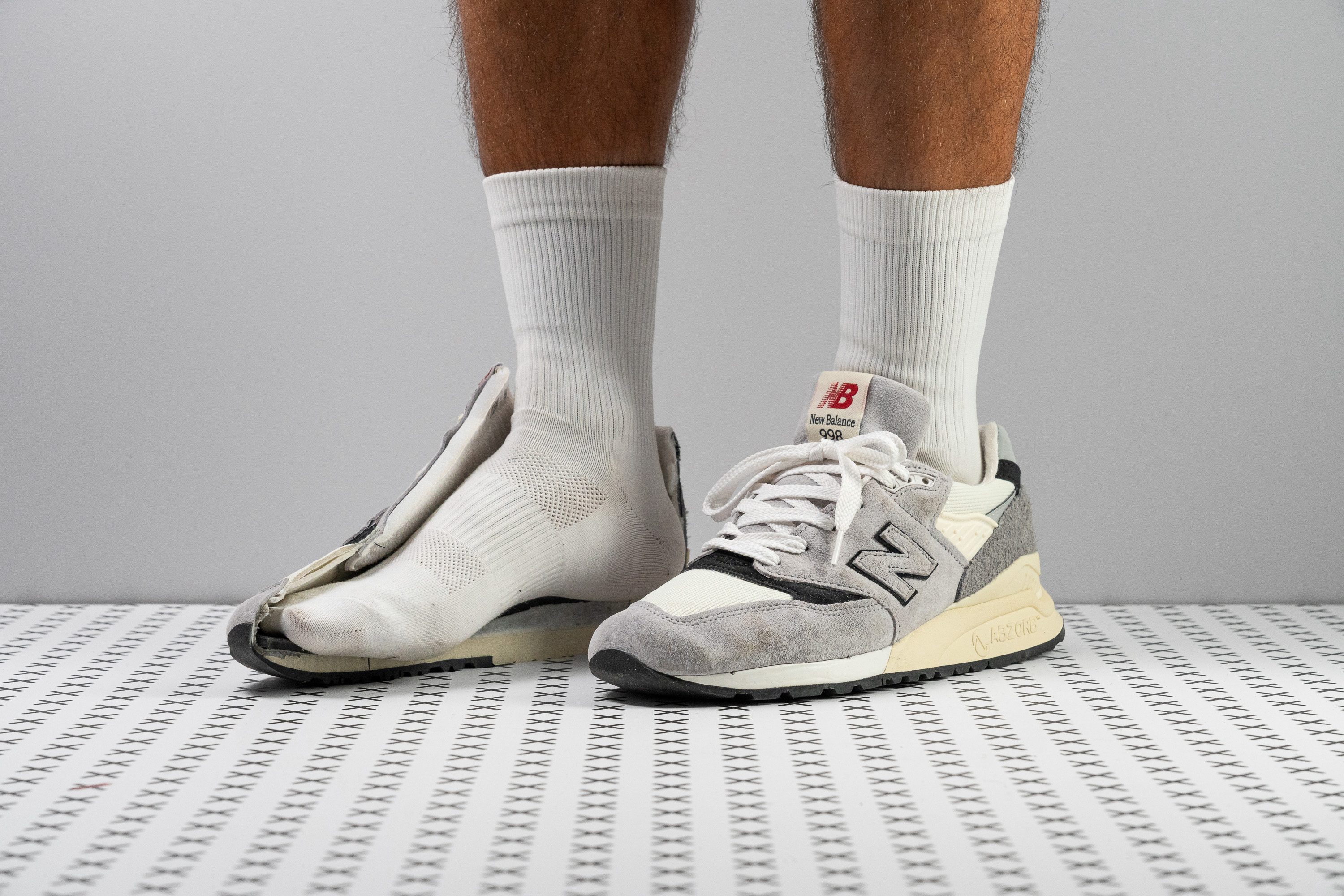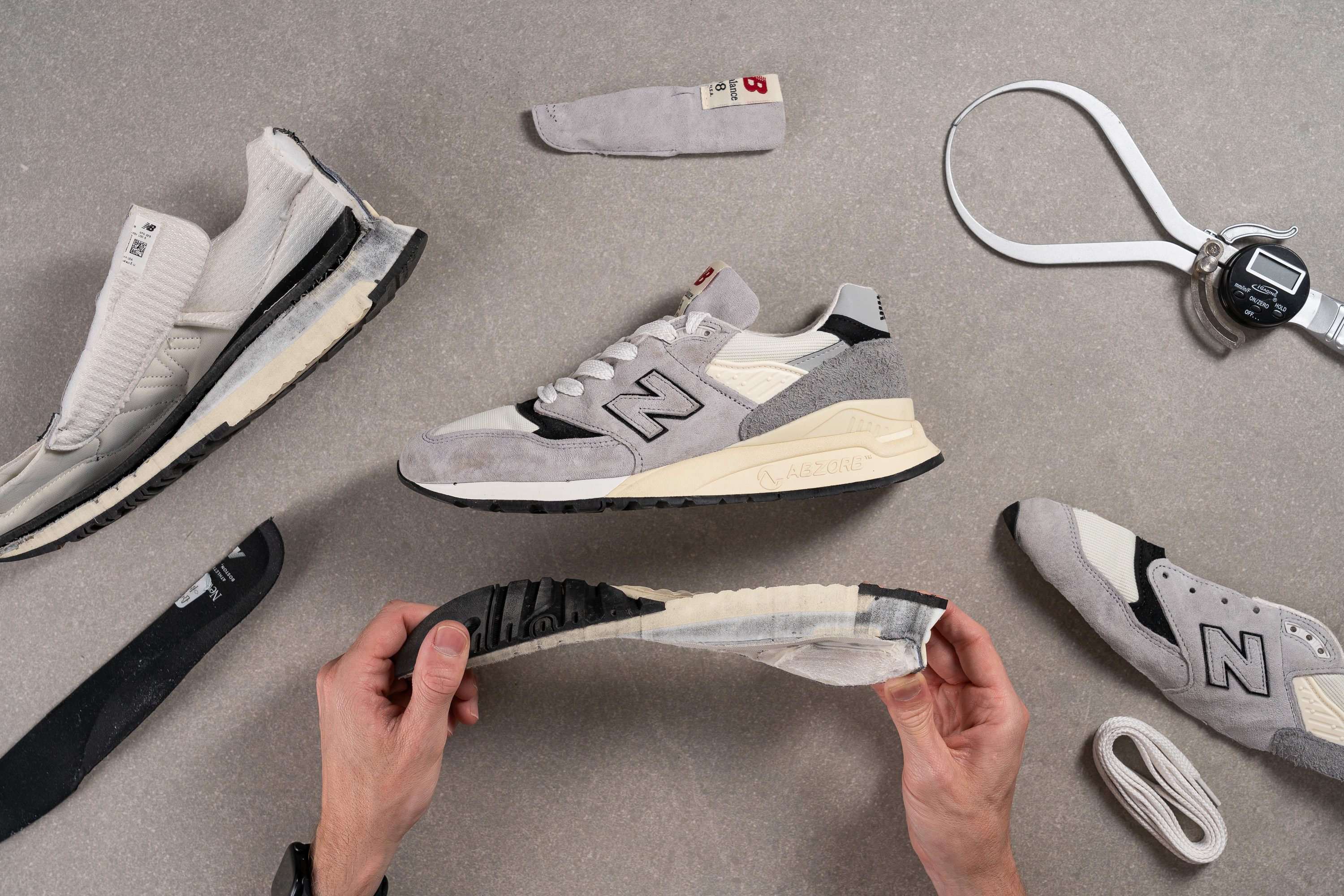Our verdict
Pros
- Wonderfully cushioned ride
- High-quality and durable upper
- Retro and stylish design
- Nicely padded
- Doesn't feel heavy on foot
- Fairly grippy on urban surfaces
- Breathable and flexible structure
Cons
- High price-point
- Long tongue can be irritating
Audience verdict
Comparison
The most similar trainers compared
+ + Add a shoe | |||||
|---|---|---|---|---|---|
| Audience score | 87 Good! | 88 Good! | 91 Great! | 87 Good! | |
| Price | £210 | £100 | £155 | £130 | |
| Style | ClassicSporty | ClassicSporty | RetroSportyFuturistic | RetroSporty | |
| Shock absorption | - | - | Moderate | - | |
| Energy return | - | - | High | - | |
| Traction | - | - | Moderate | - | |
| Breathability | Breathable | Breathable | Breathable | Breathable | |
| Weight lab | 13.9 oz / 393g | 13.8 oz / 390g | 13.1 oz / 370g | 12.7 oz / 361g | |
| Size | True to size | True to size | True to size | True to size | |
| Midsole softness | Balanced | Firm | Balanced | Balanced | |
| Material | LeatherMeshSuede | LeatherMeshSuede | Mesh | LeatherMeshSuede | |
| Season | SpringFall | SpringFall | Summer | SpringFall | |
| Inspired from | Running | Running | Running | Running | |
| Width / fit | Medium | Medium | Wide | Medium | |
| Toebox width | Medium | Medium | Medium | Medium | |
| Leather/suede quality | - | - | - | Real suede | |
| Toebox durability | Decent | Decent | Good | Decent | |
| Heel padding durability | Bad | Decent | Decent | Decent | |
| Outsole durability | Good | Good | Good | Good | |
| Heel stack lab | 34.1 mm | 34.8 mm | 40.3 mm | 34.1 mm | |
| Stiffness | Moderate | Stiff | Moderate | Stiff | |
| Tongue padding | Average | Average | Average | Average | |
| Drop lab | 14.5 mm | 14.3 mm | 15.8 mm | 12.9 mm | |
| Forefoot | 19.6 mm | 20.5 mm | 24.5 mm | 21.2 mm | |
| Removable insole | ✓ | ✓ | ✓ | ✓ | |
| Heel tab | None | None | None | None | |
| Torsional rigidity | Moderate | Moderate | Moderate | Moderate | |
| Heel counter stiffness | Moderate | Flexible | Stiff | Stiff | |
| Reflective elements | ✓ | ✓ | ✗ | ✓ | |
| Closure | Laces | Laces | Laces | Laces | |
| Top | Low top | Low top | Low top | Low top | |
| Ranking | #107 Bottom 11% | #96 Bottom 20% | #60 Top 50% | #108 Bottom 10% | |
| Popularity | #66 Bottom 45% | #71 Bottom 41% | #56 Top 47% | #73 Bottom 39% |
Who should buy
We believe the New Balance 998 deserves a spot in your sneaker collection if you're looking for:
- A casual model with a runner soul that is extra comfy to walk around all day.
- A classic New Balance shoe with a top-notch design and premium materials.
- Breathable and durable kicks that will stay by your side for a long time.
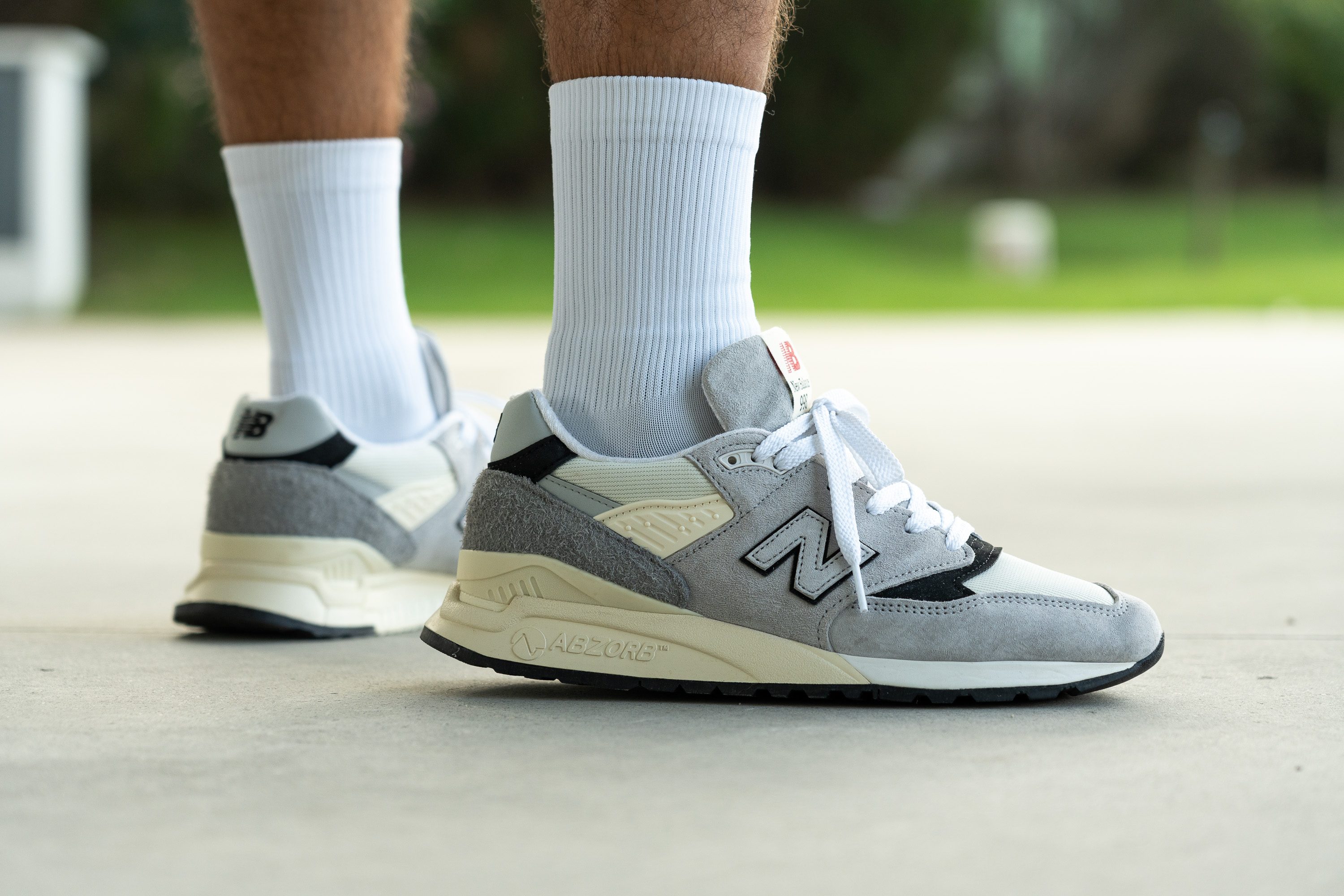
Who should NOT buy
Cushioning
Heel stack
Our calliper had to open wide to measure this shoe's heel stack.
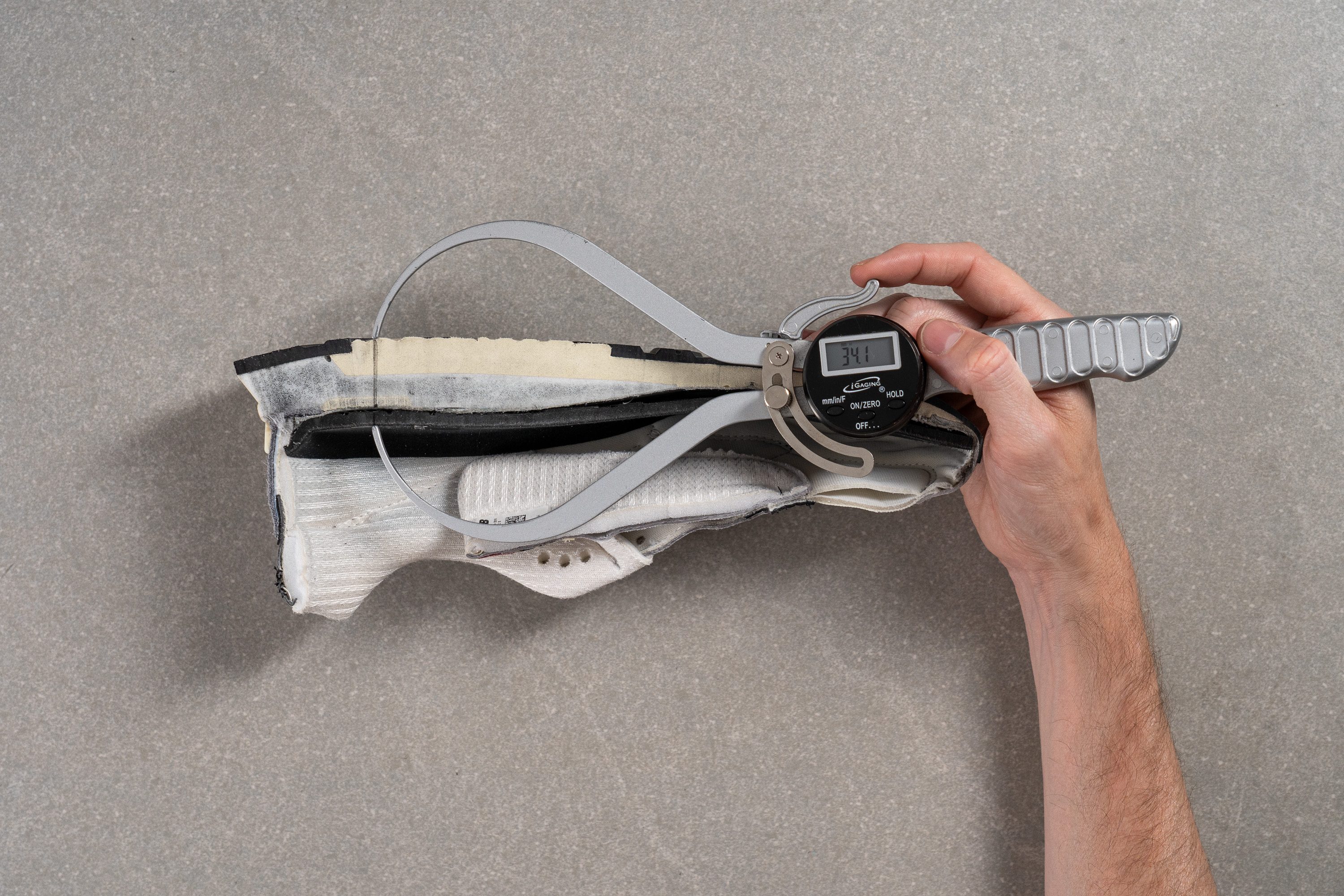
At 34.1 mm, it's higher than average! It features a thick midsole that uses ABZORB cushioning, which offered us a soft and comfortable ride. As you might already imagine, this meant that our wear tests were bliss. We loved showing off this shoe whilst walking around town, running errands, or meeting some friends to grab a bite.
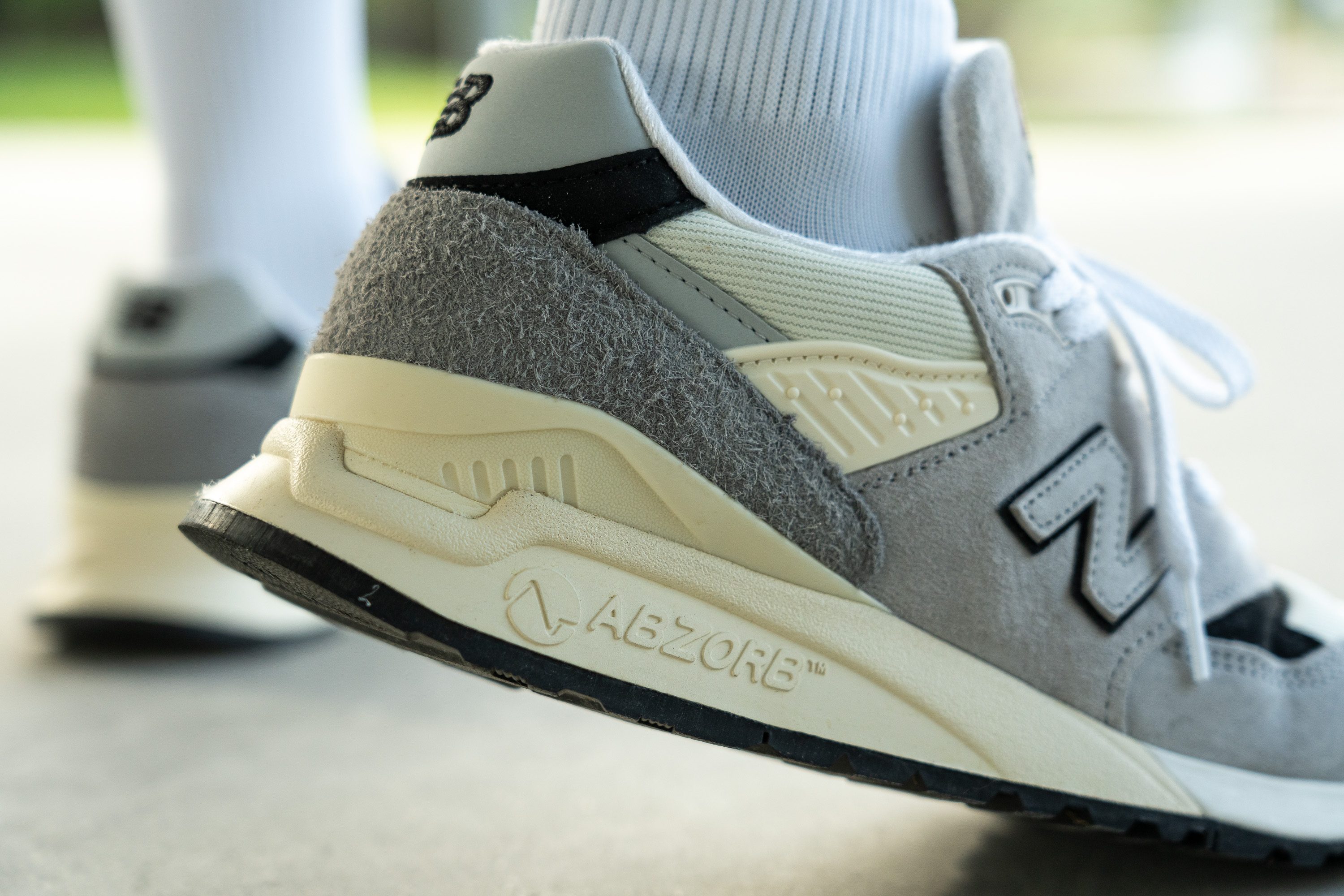
| 998 | 34.1 mm |
| Average | 30.7 mm |
Forefoot stack
The 996 also has a forefoot higher than average.
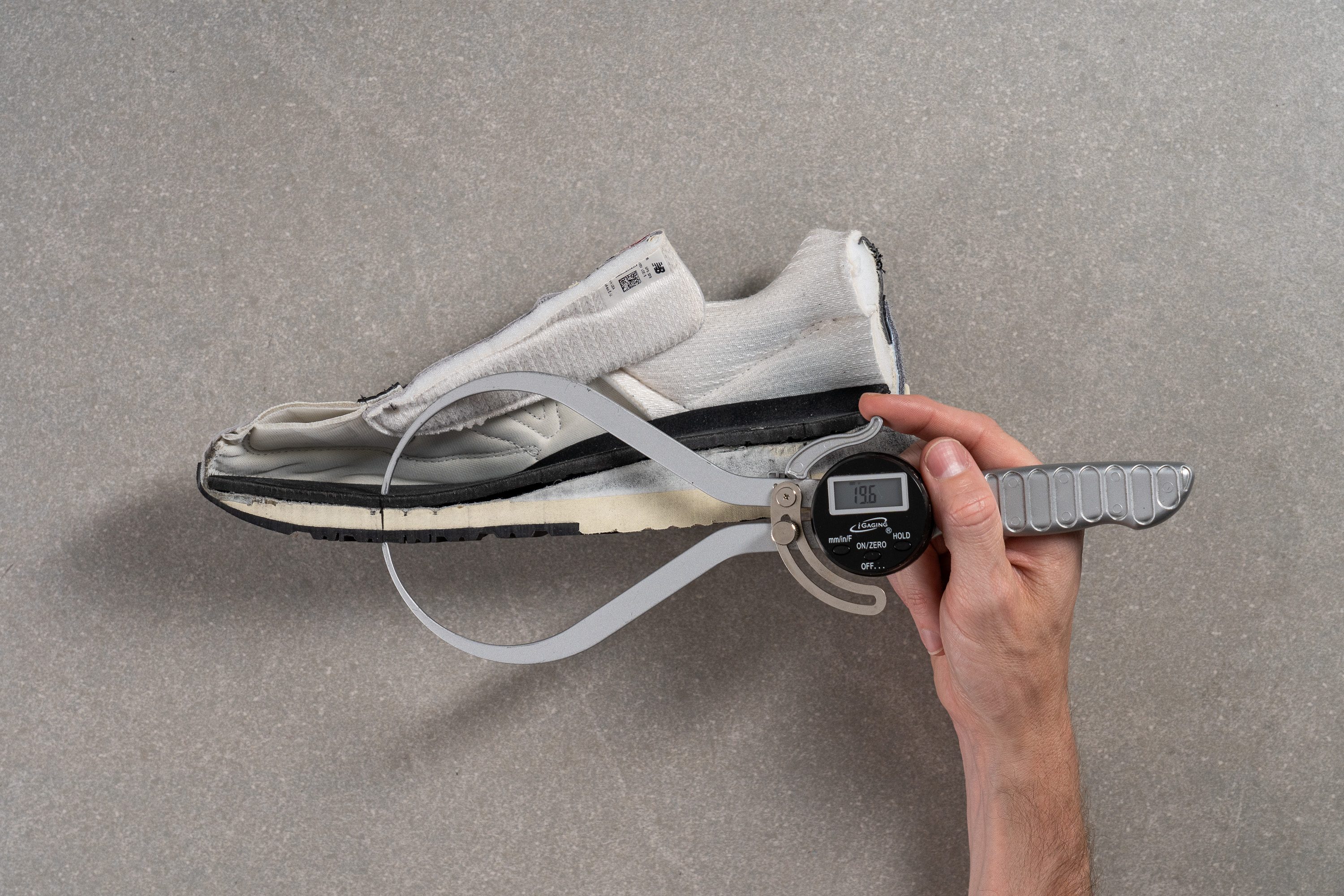
Our calliper returned 19.6 mm, which means our toes were protected from the harshness of urban surfaces. We really enjoyed this setup, as it offered us great shock absorption and made us want to keep walking!
| 998 | 19.6 mm |
| Average | 19.5 mm |
Drop
The difference between the heel and the forefoot stacks is pretty big, which means this shoe's drop is higher than average.
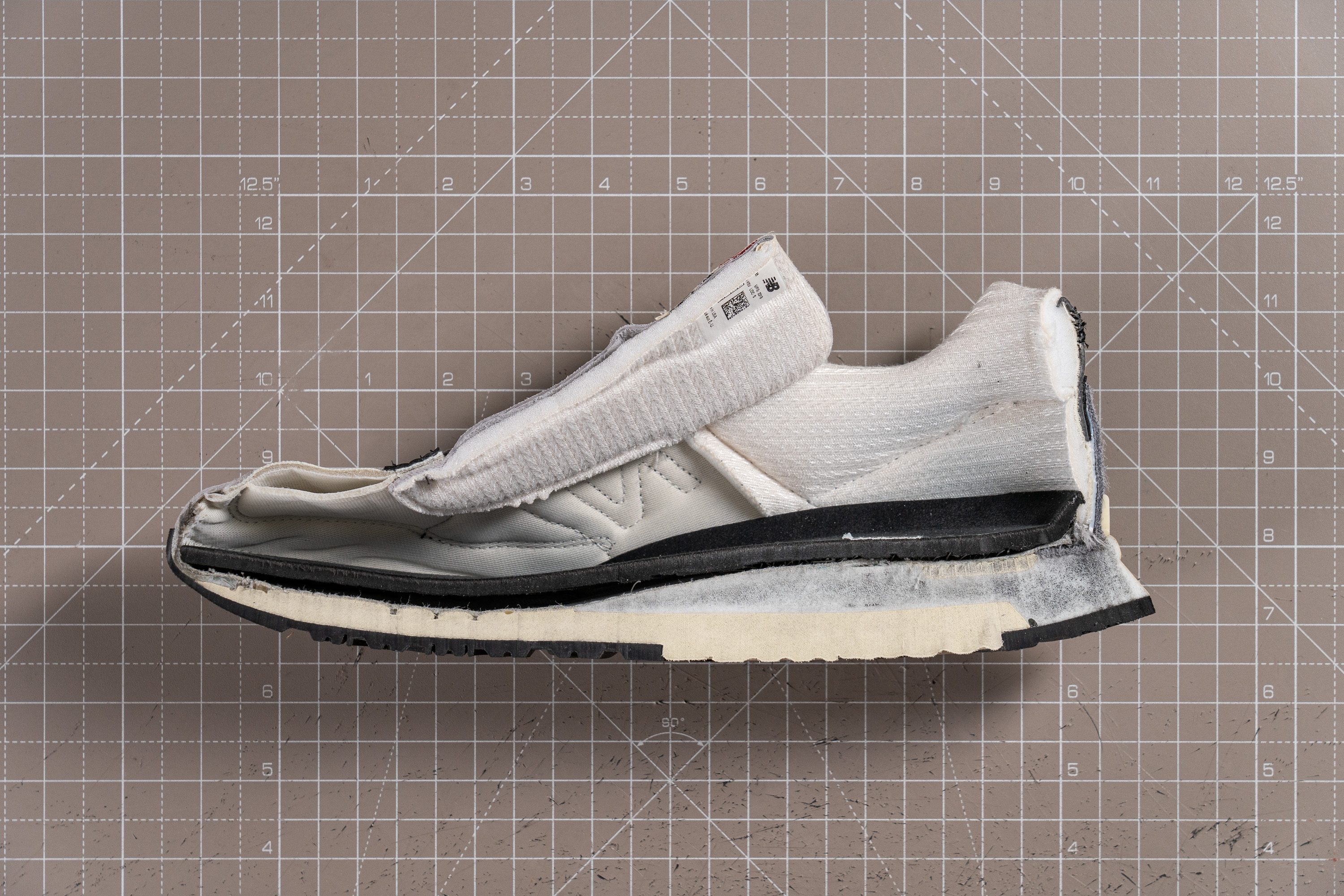
The drop of 14.5 mm sounds like a lot, but our feet didn't have to get used to it or anything. We felt the heel was higher than the toes, that's for sure, but this didn't make us walk in a different way, and it definitely wasn't uncomfortable either!
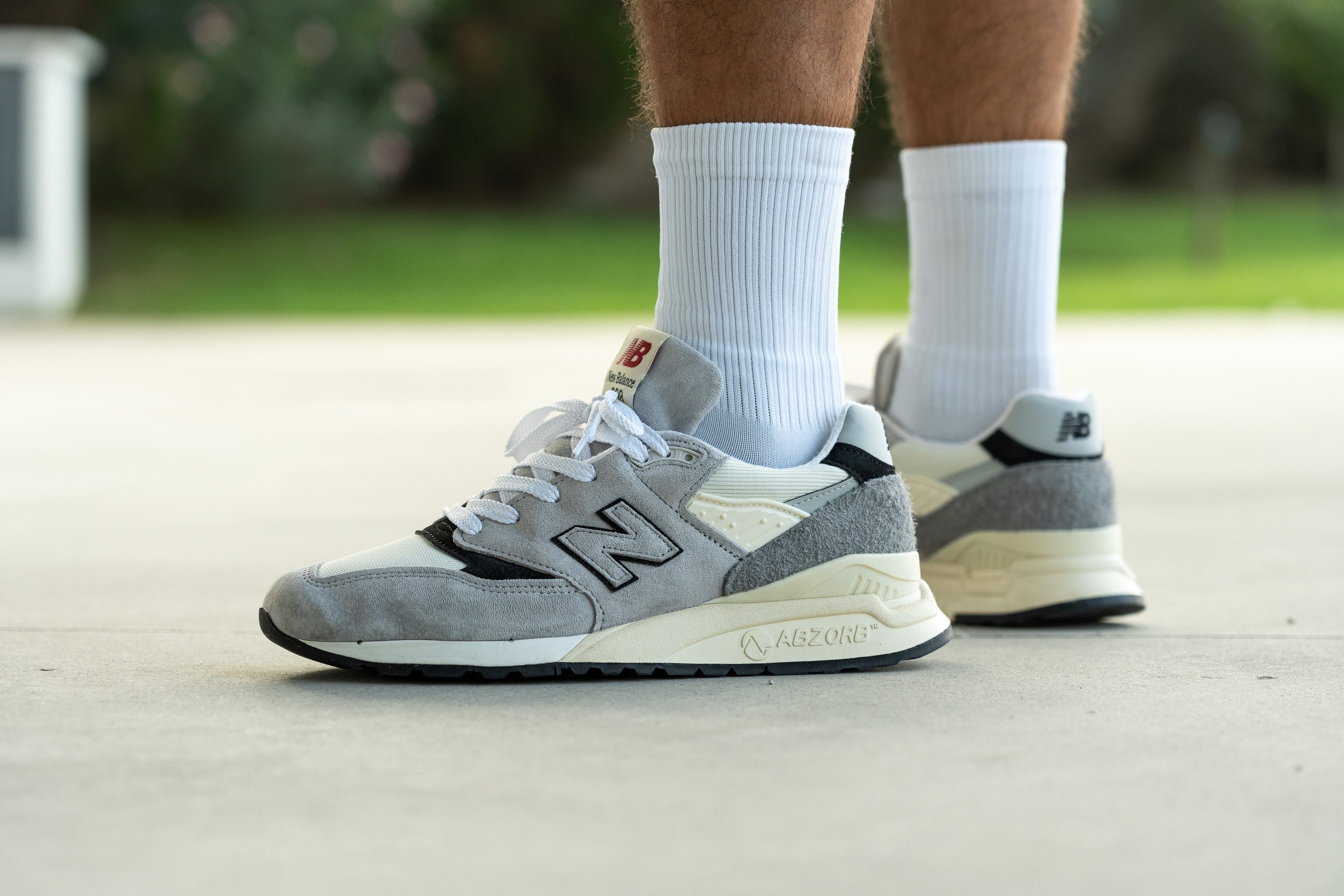
There's no such thing as a "good" or "bad" drop, it honestly just depends on personal preference!
| 998 | 14.5 mm |
| Average | 11.2 mm |
Midsole softness
After looking at the cut-up picture of the 998 in the last section, you can probably tell there are two different materials in the midsole. First, we have the white and grey one, right under the insole in the heel; and then, the white-ish one that goes all the way down to the outsole.
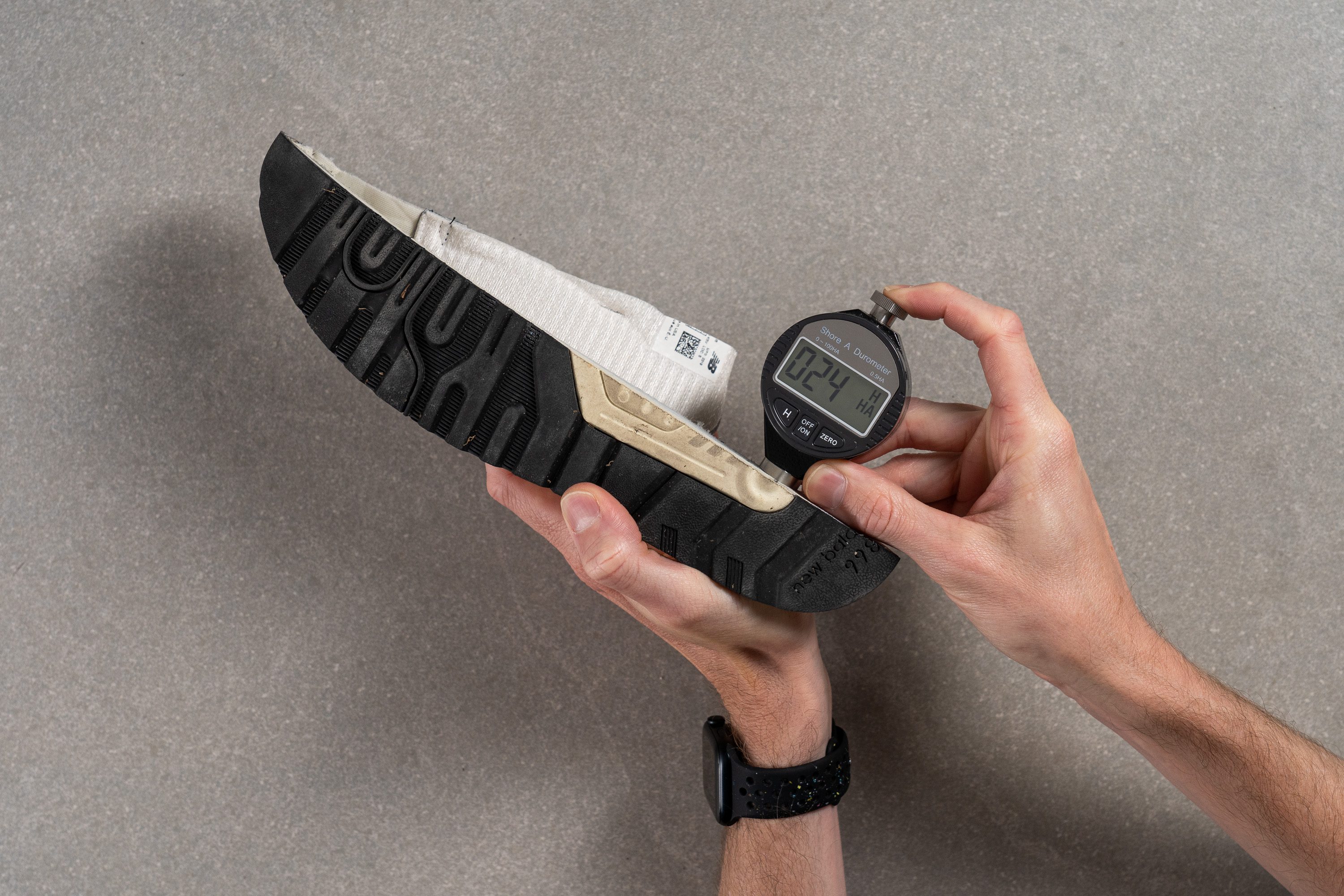
The foam closer to the foot got 24 HA when we measured it with our durometer, indicating it's softer than average.
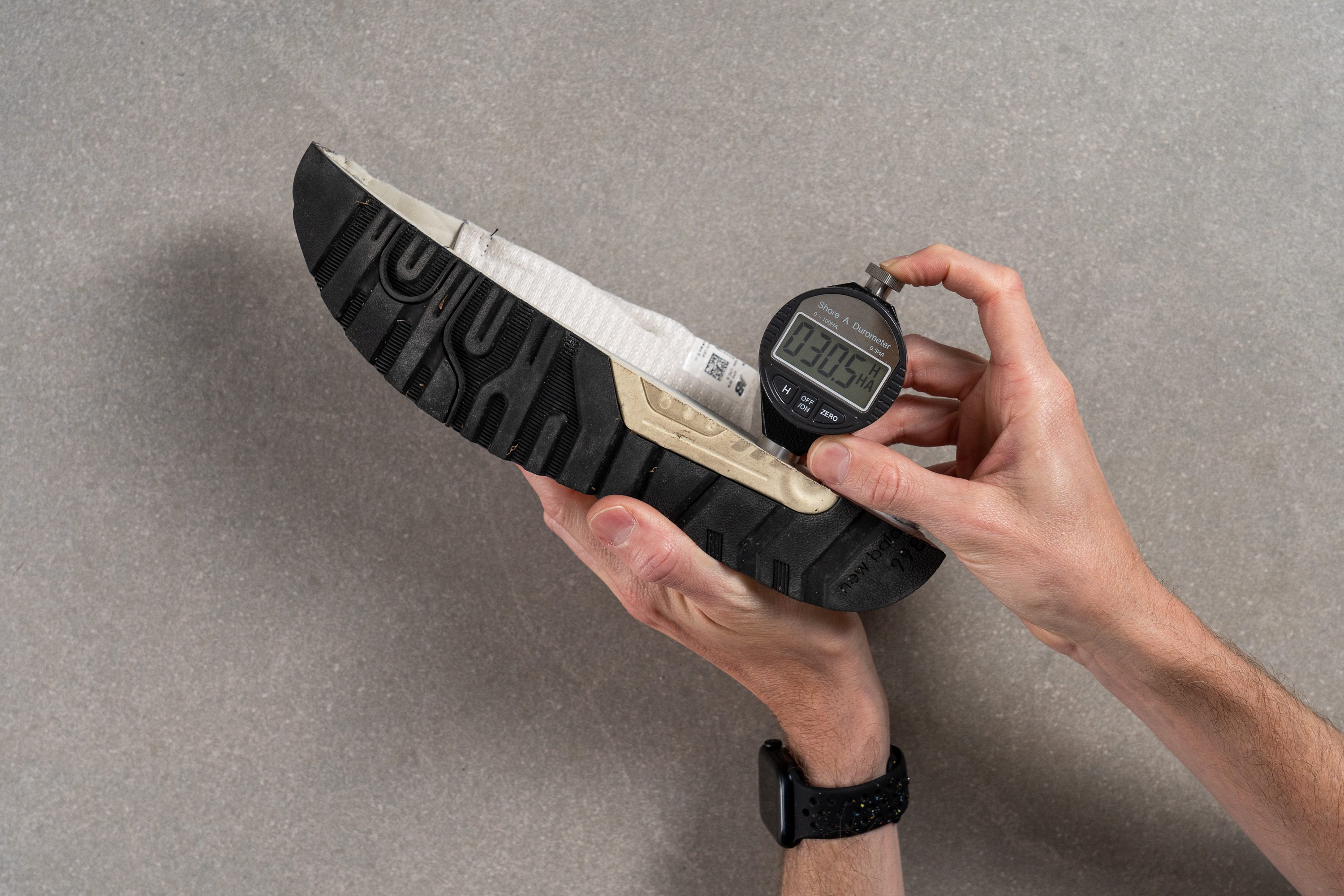
On the other hand, the one that's closer to the ground returned 30.5 HA, which means it's harder than average.
We believe this design offers the best of both worlds: a comfortable and soft foam right under our feet and a harder one protecting us from the surface.
| 998 | 23.9 HA |
| Average | 28.6 HA |
Size and fit
Size
New Balance 998 fits true to size (27 votes).
Internal length
| 998 | 276.3 mm |
| Average | 272.3 mm |
Width / Fit
Our wear test showed that the NB 998 has a spot-on fit for a D medium-width sneaker. Creating the gel mould of the shoe's interior only confirmed our initial impressions.
In the widest part of the mould, our calliper measured an average width of 91.2 mm.
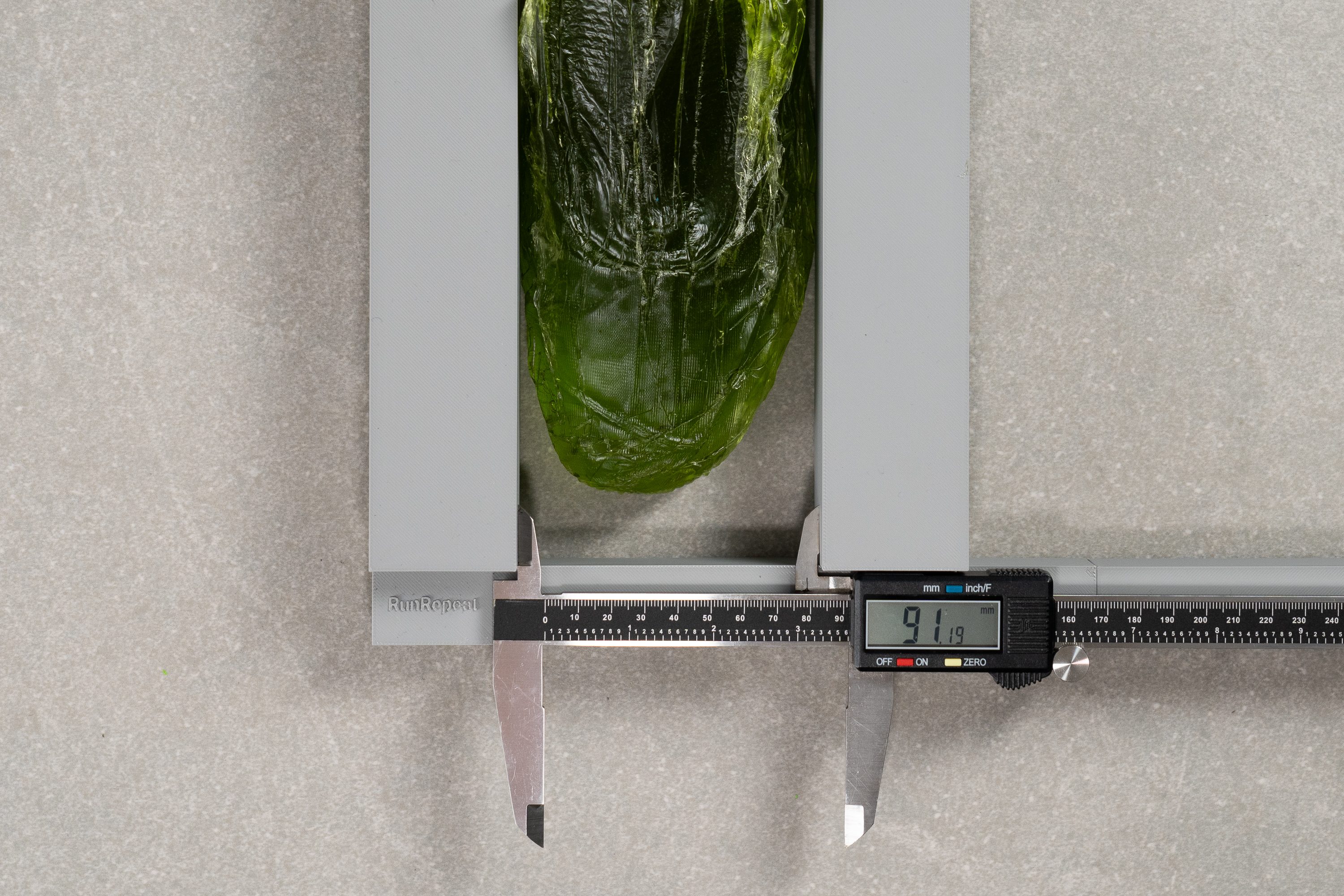
| 998 | 91.2 mm |
| Average | 92.5 mm |
Toebox width
The taper angle is very mild in this New Balance sneaker and didn't cause any pinching on the toes. Moving the calliper further up the mould to the big toe area, it returned another standard reading of 67.3 mm.
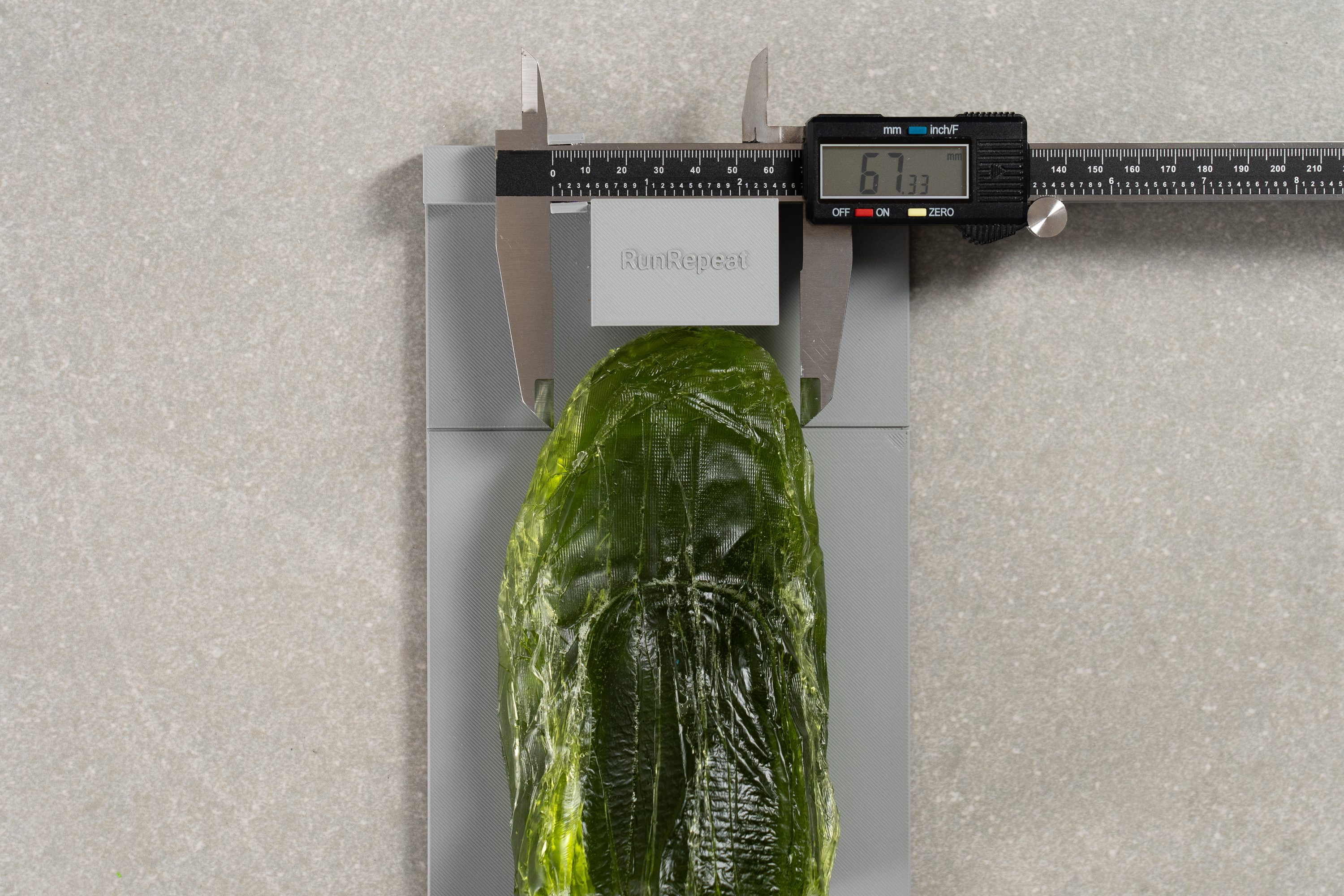
| 998 | 67.3 mm |
| Average | 68.9 mm |
Toebox height
There is no need to worry about vertical pressure either because the toebox height of the 998 shows an adequate reading of 26.0 mm.
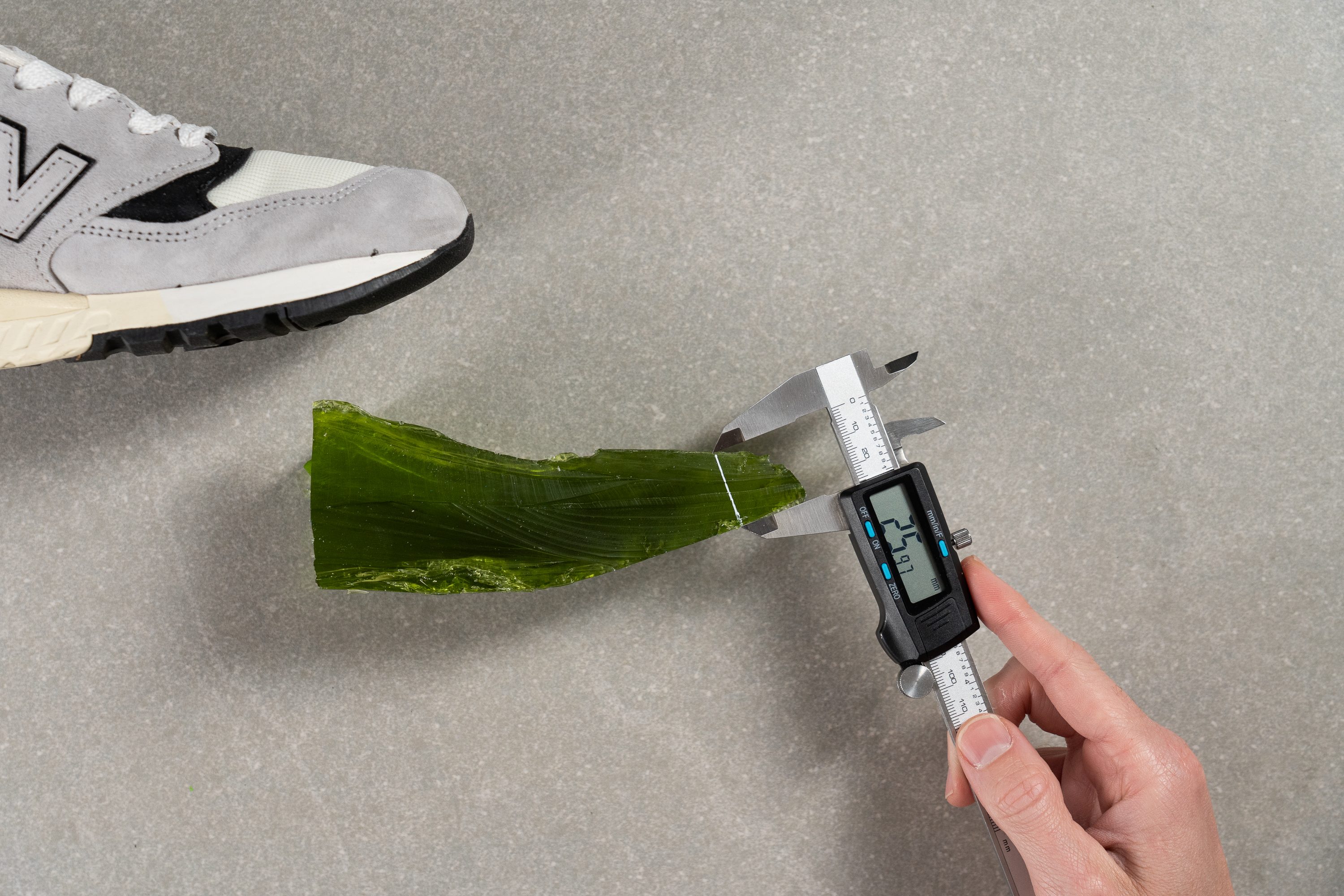
| 998 | 26.0 mm |
| Average | 27.8 mm |
Flexibility / Stiffness
After our torsional rigidity test, we already guessed the New Balance 998 would be pretty flexible. And we had the same feeling during our wear tests, as the shoe moved comfortably alongside our feet.
When we took it to our lab, we saw we needed 16.8N to make it bend all the way up to 90 degrees. This score is a solid 27% lower than average, which means this shoe is way more flexible than many of the shoes in its category.
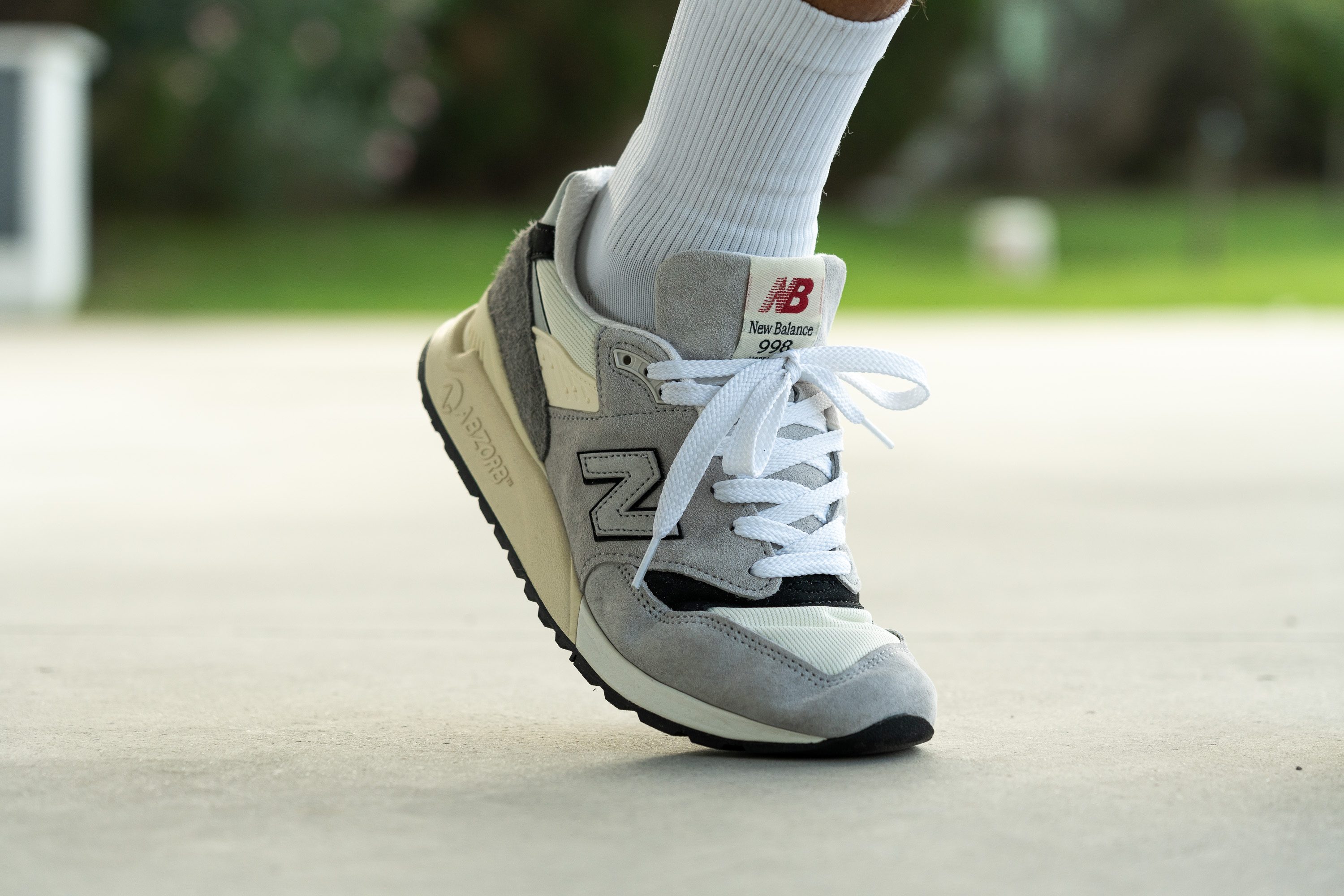
We know we have already mentioned multiple times throughout this review just how comfortable the 998 is, but trust us, the fact that it's this flexible just makes every single walk with it even better!
This test follows an older methodology, which is why you don't see recently tested shoes in the chart. Results from different methodologies can not be compared.
| 998 | 16.8N |
| Average | 23.3N |
Weight
During our wear tests, we didn't feel this shoe was a burden to our feet. We can't say it's the lightest model out there, but it definitely didn't feel heavy to us.
At 13.9 oz/393.0g, the 998's weight is just average. We were really happy to learn this, as the thicker outsole and high-quality materials could've made it heavier.
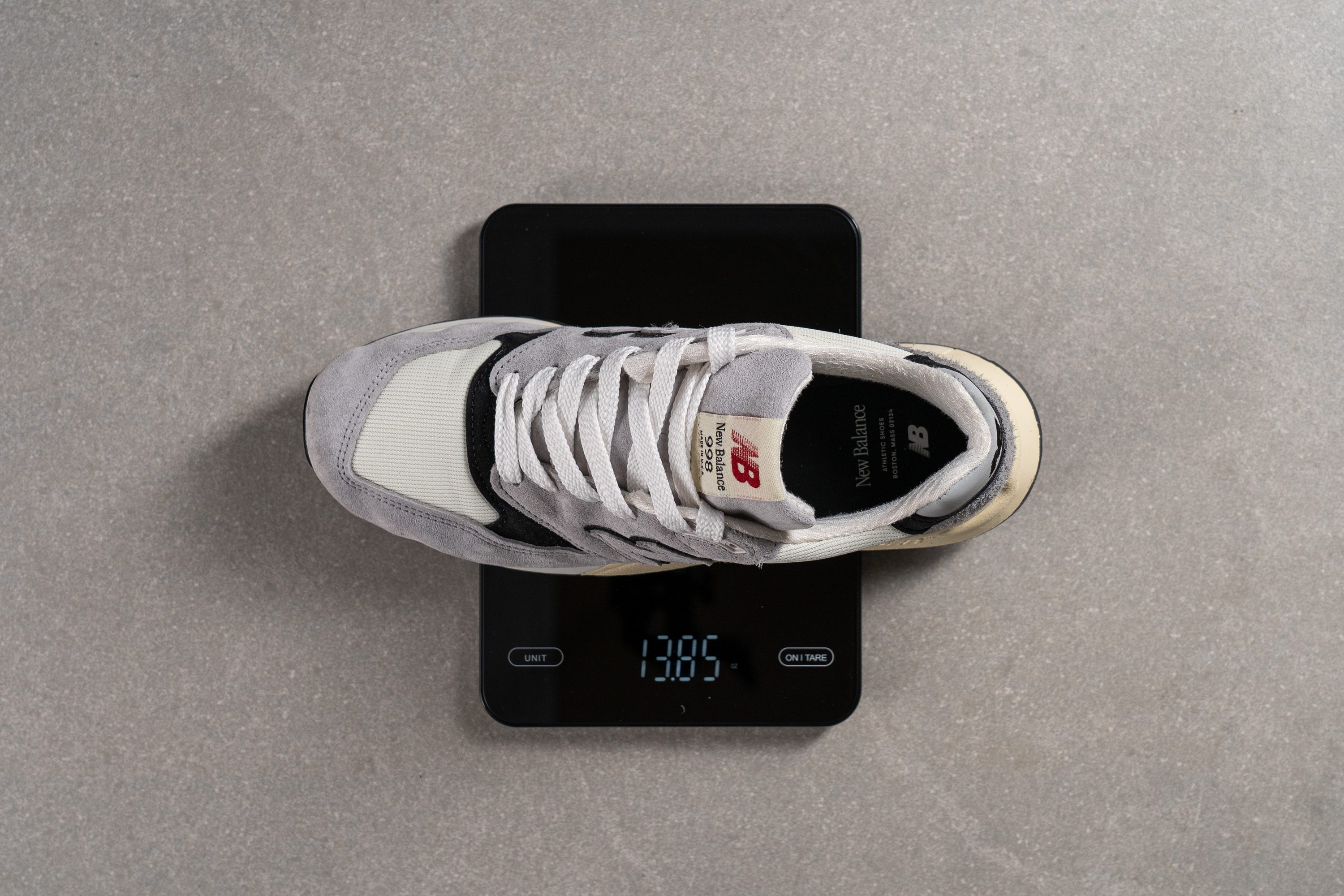
Nevertheless, once again, New Balance didn't disappoint!
| 998 | 13.9 oz (393g) |
| Average | 13.8 oz (390g) |
Breathability
When we had a look at the New Balance 998, we couldn't see any ventilation gaps around!
As you can see, the light doesn't manage to get through any of its parts and shine brightly. Even though this made us feel suspicious, we still wanted to ask our smoke machine and microscope.
Check that out! This NB's toebox showed wonderful results: it let all the air go through its toebox with no problems. That thick and constant column showed us why our feet didn't feel toasty during our wear tests when temperatures went up.
Also, in comparison with the poor Jordan Legacy 312, which couldn't get more than a 1/5 on this same test, the performance of the 998 is even more impressive.
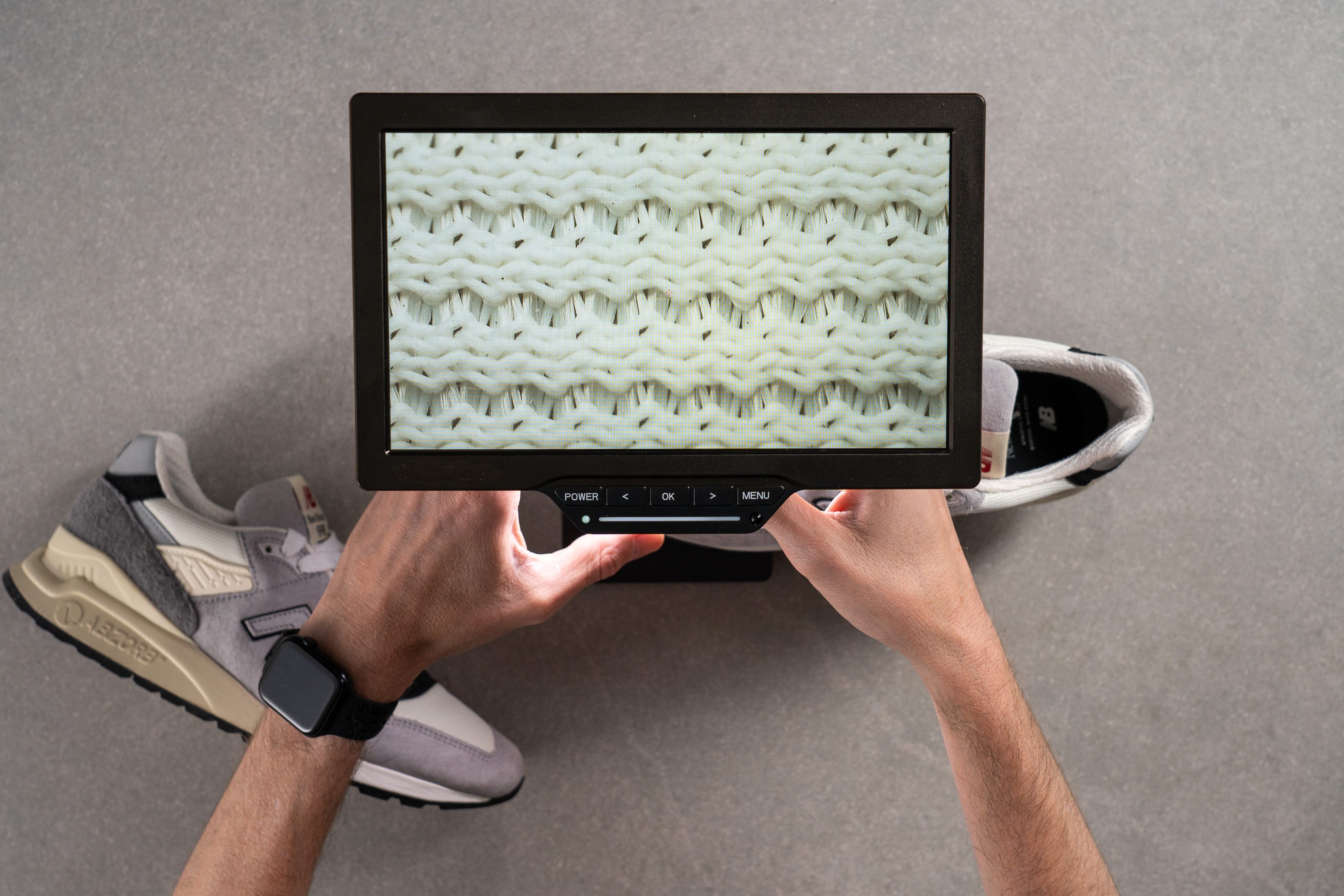
The mesh of the toebox is the main character here. Can you see those gaps in between the threads? The smoke moved freely past them, letting the shoe breathe.
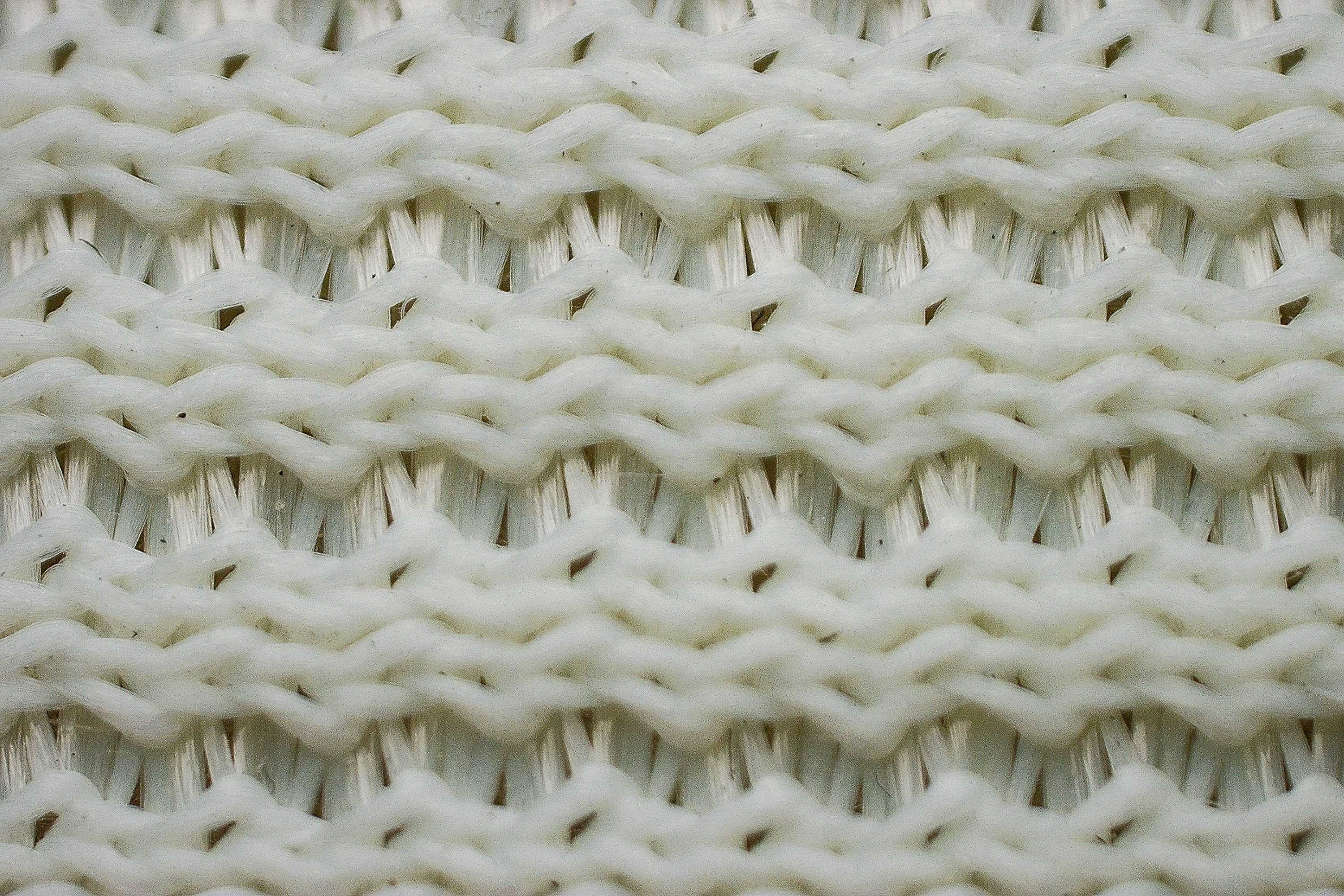
In conclusion, we've decided to give the New Balance 998 a fantastic 4/5 on our breathability test.
| 998 | 4 |
| Average | 3 |
Stability
Lateral stability test
The runner soul of this shoe can be seen in many of its features, one of them being its collar.
As you can see, it didn't let our ankles overextend themselves. Even though the 998 doesn't feature a plastic/tough leather upper that offers immovable containment, it's padded collar does the job perfectly well.
Torsional rigidity
Walking with this shoe was just fantastic. Our feet enjoyed every single step, and we can say it bent alongside their moves every single time.
Our fingers didn't struggle that much to twist and bend it. Even though it still offers some support, its materials focus on being comfortable, so it didn't put up much of a fight. That's why we have decided to give it a 3/5 on our torsional rigidity test.
Also, it has a rubberized wall right in the heel area, which didn't increase the torsional rigidity levels of the shoe. When you walk, you don't really bend the shoe in that part, so it just adds some extra structure to the overall design instead of making it more rigid.
| 998 | 3 |
| Average | 3.6 |
Heel counter stiffness
Prioritising comfort once again, the brand didn't go for a crazy stiff heel counter.
As you can see, our thumb didn't struggle much, and the Achilles area didn't act like a wall either. After taking all this into account, we have decided to give this New Balance pair a 3/5 on our heel counter stiffness test.
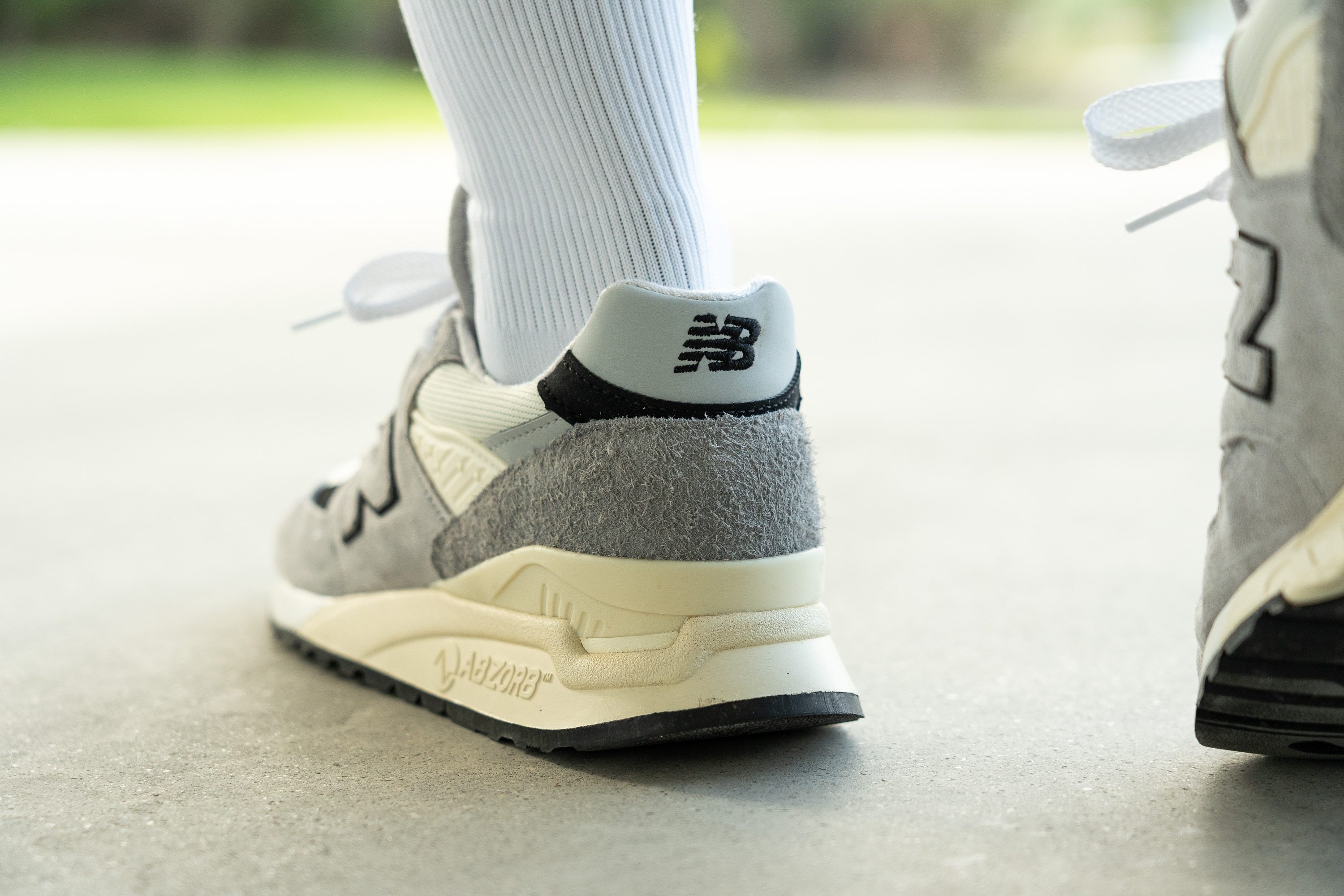
| 998 | 3 |
| Average | 3.2 |
Midsole width - forefoot
Our calliper opened up to 109.4 mm when we measured this shoe's midsole width in the forefoot.
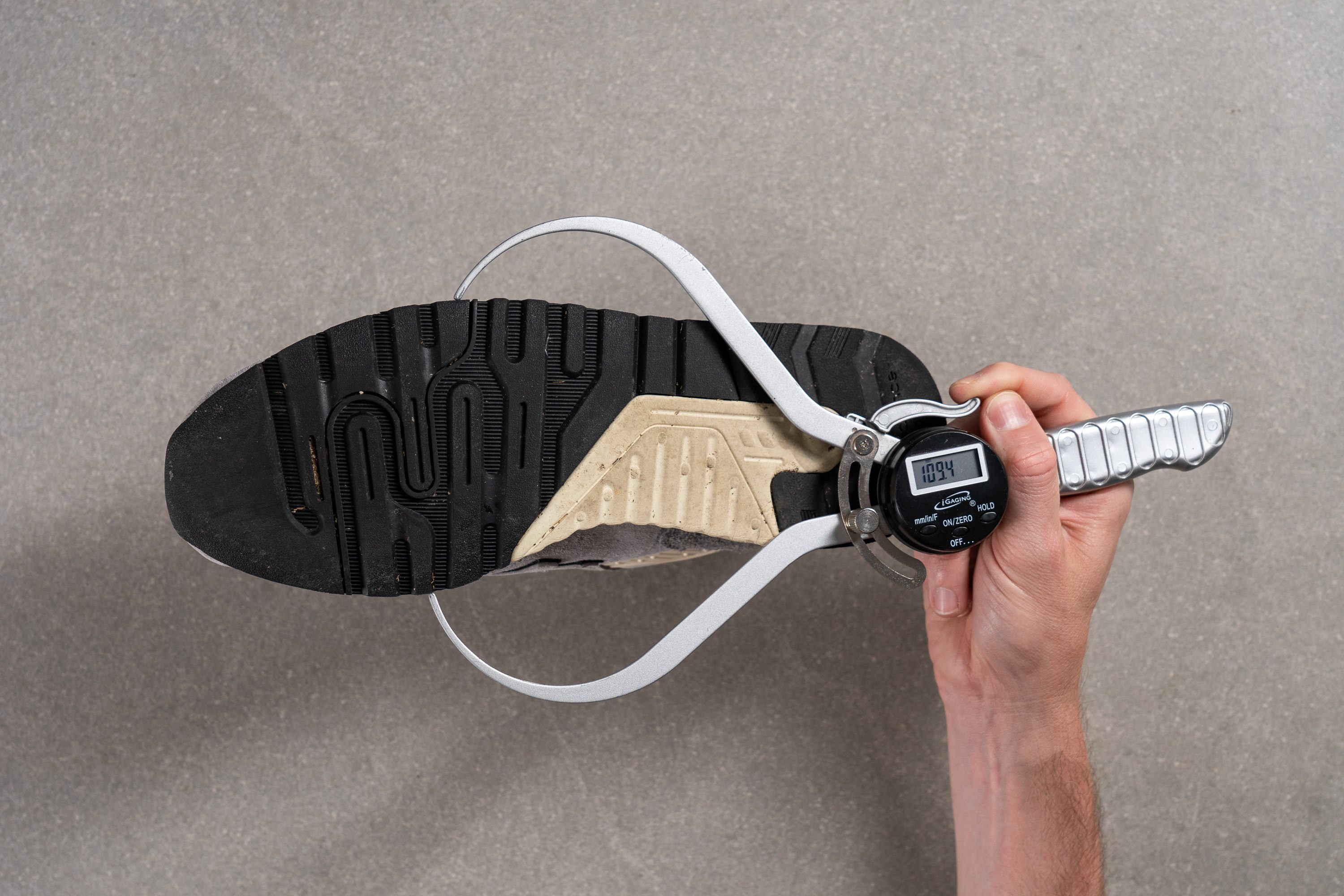
This result is higher than average, which means this New Balance has a wider base than average. Do you know what that means? A more stable ride!
| 998 | 109.4 mm |
| Average | 108.9 mm |
Midsole width - heel
The 998's midsole width in the heel is wider than average at 86.6 mm.
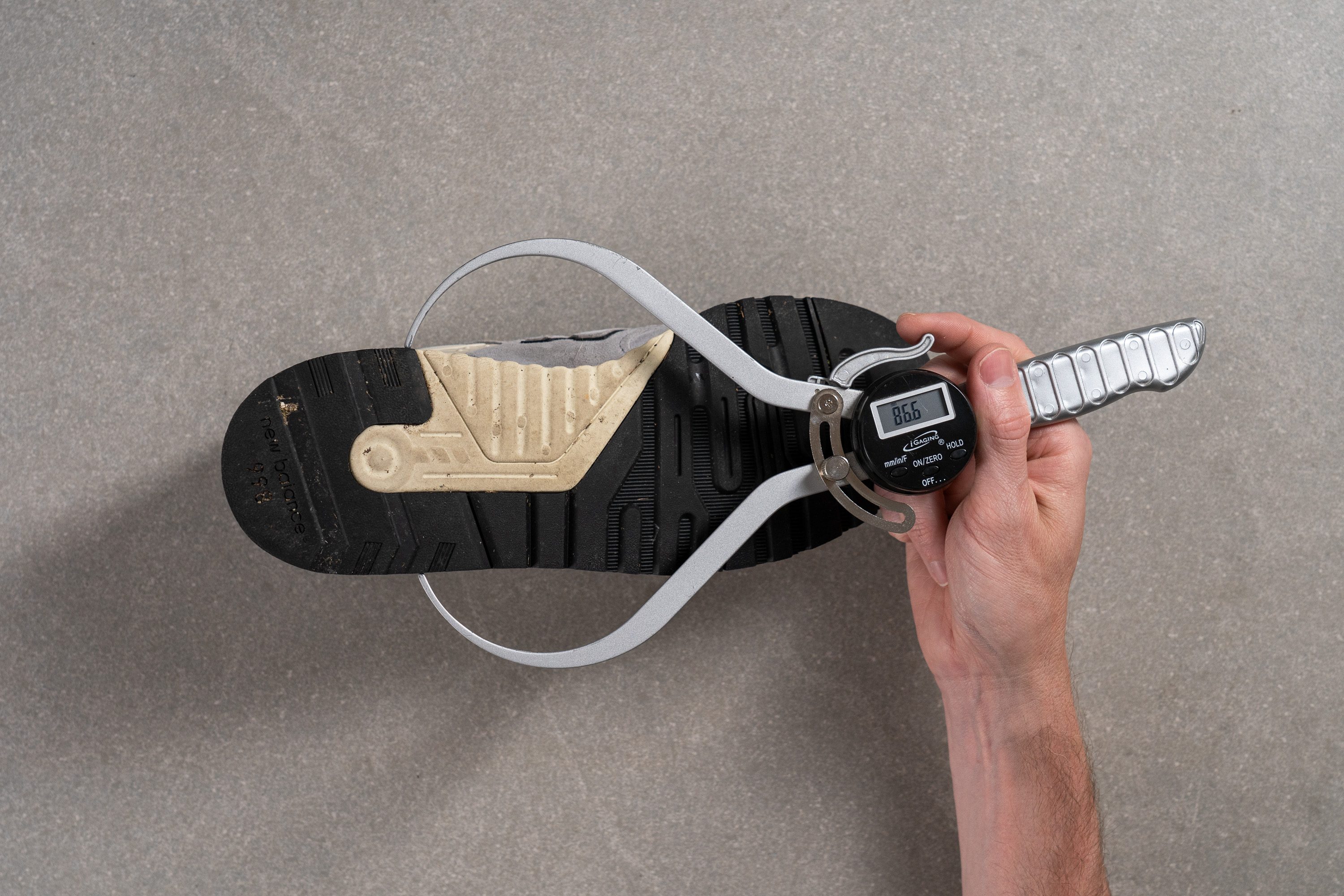
Once again, this means there's a wider base that makes every step even more comfortable.
| 998 | 86.6 mm |
| Average | 84.0 mm |
Durability
Leather/Suede quality
To check the leather and suede quality of a shoe, we use our butane torch and scratch awl. First, we burn the material, and then we start scratching to see how it responds.
The N of the logo was our first victim. As you can see, it doesn't melt, and there isn't a big flame at the beginning. Consequently, it's authentic.
The suede central panel doesn't burst into flames either, and it doesn't show a sticky texture after the test. Once again, we can verify it's authentic!
Last but not least, the suede of the heel patch also showed us that fire was not enough to make it melt! Wonderful news yet again: it's authentic!
Toebox durability
The high-quality materials of this New Balance pair made us have high expectations on the toebox durability test. We know our Dremel is a force to reckon with, though, so we had to see it with our own 2 eyes!
We drilled non-stop during 12 seconds at 5K RPM and with 3.2N of force. Once we put the tool aside, we were pretty happy with the results.
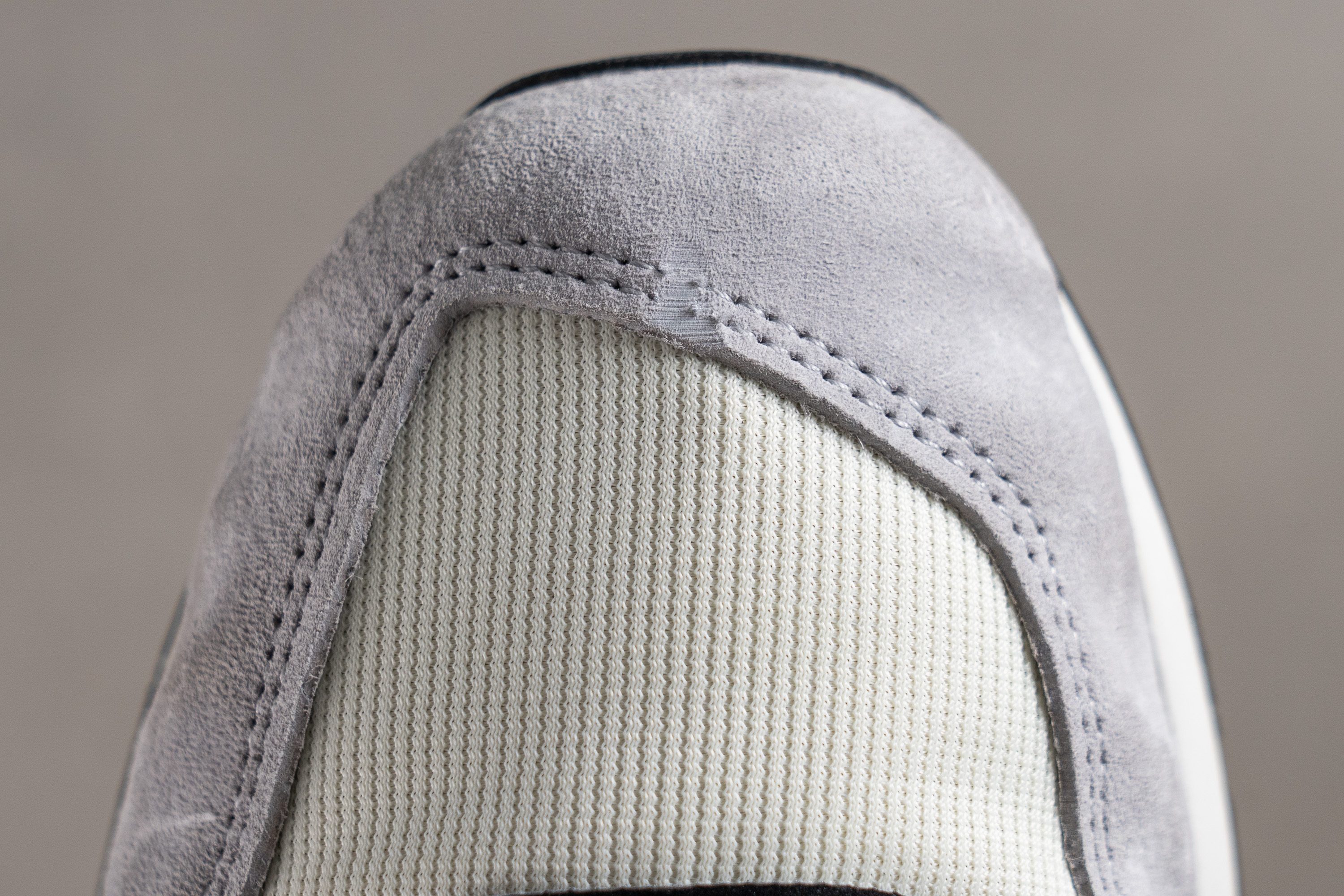
As you can see in the picture, the suede overlayer fought the Dremel bravely, and it ended up with some damage. But it was no way near enough for us to panic.
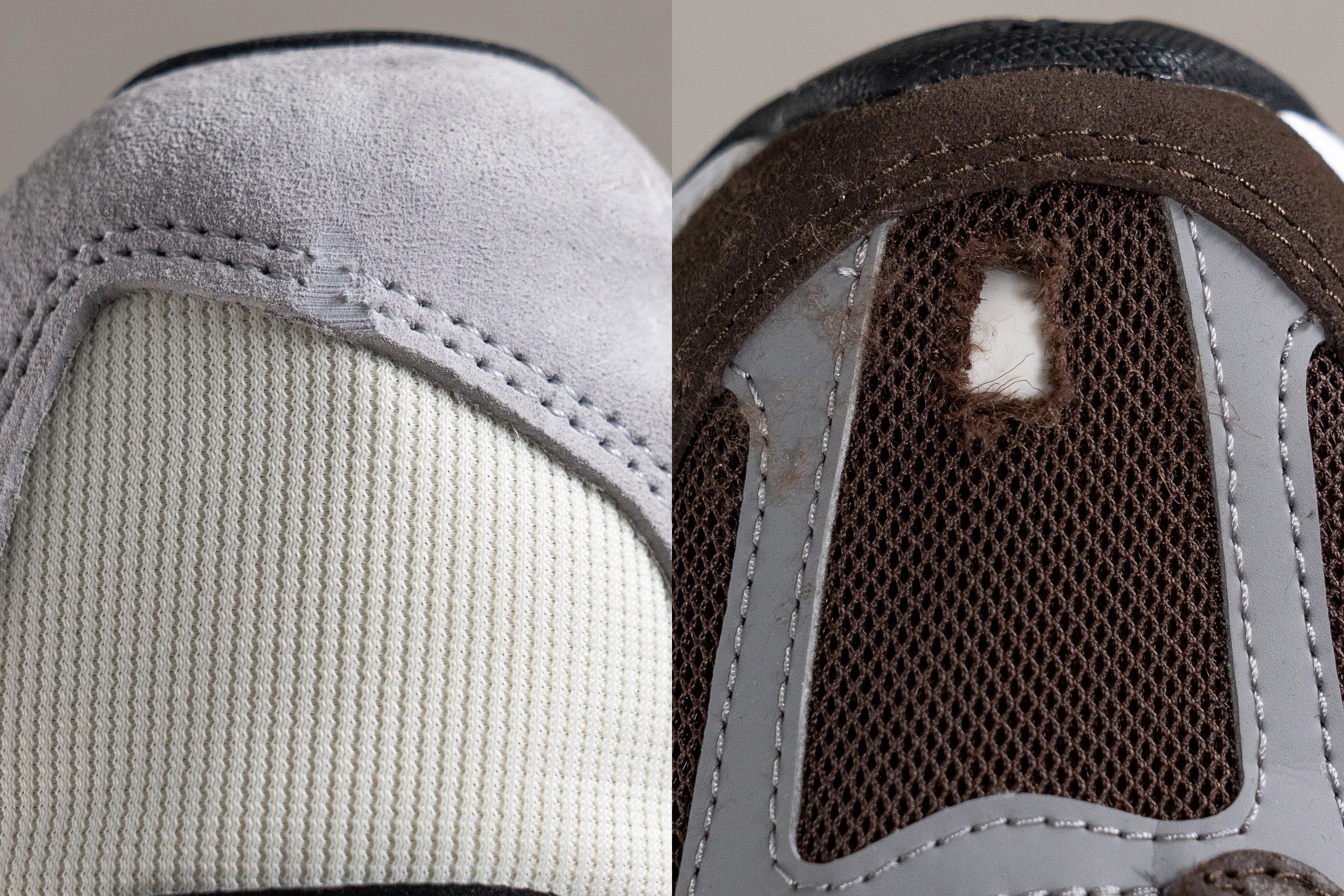
Look at the New Balance 530, which is the brown shoe on the right. Now that would make us panic! This pair couldn't get more than a 1/5 on our toebox durability test, as our Dremel made a big hole on the upper. On the other hand, the 998 managed to score a 4/5 on this same test. Which is a fantastic result!
| 998 | 4 |
| Average | 3.7 |
Heel padding durability
We moved the tool all the way back to the heel to check its durability.
The 4 seconds of this test must've felt like an eternity to the NB 998, as its heel padding tried to survive the drilling. But it ended up pretty messed up!
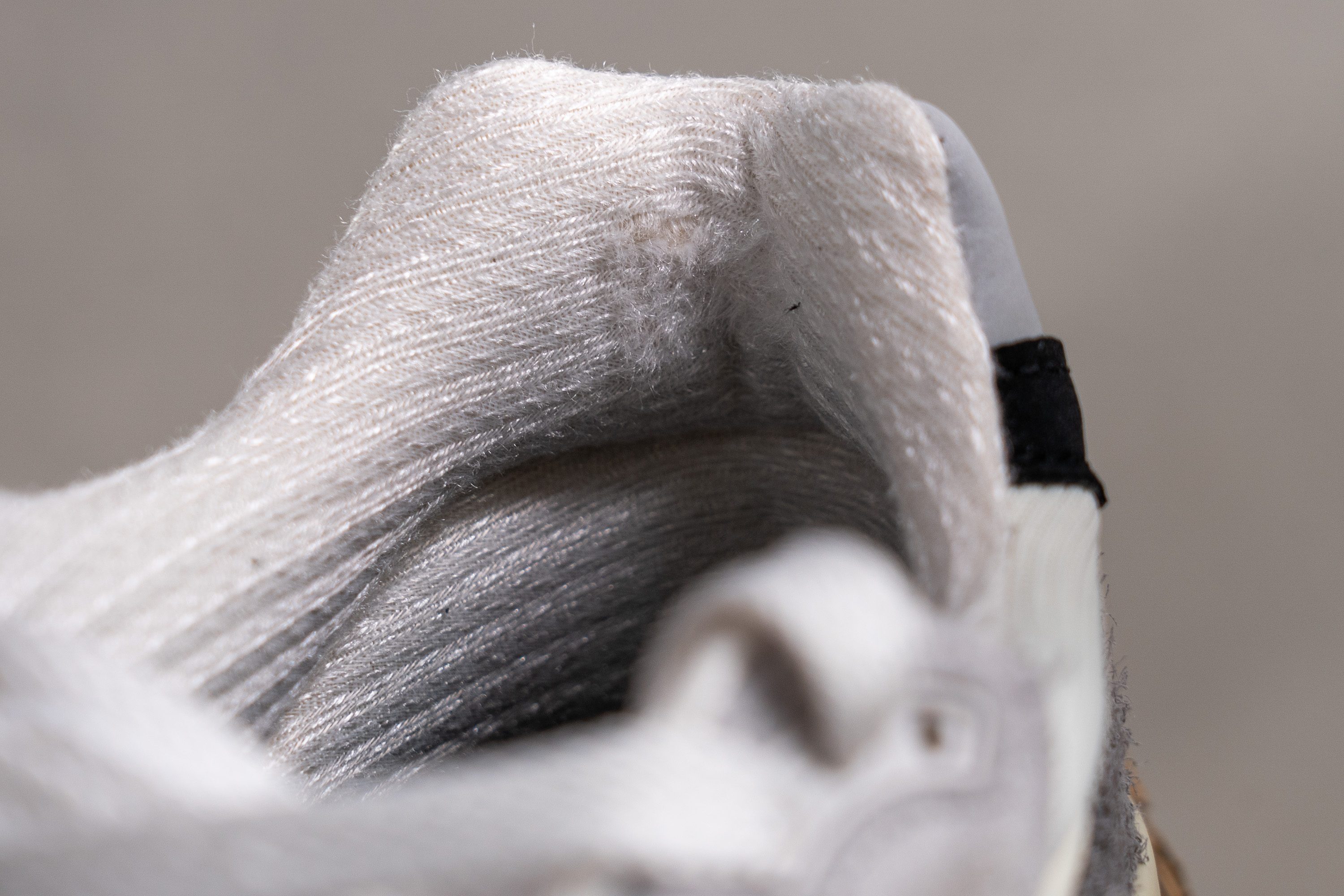
That might not look like a big mess to you, but let us show you the heel of the New Balance 990 v1 right after this same test.
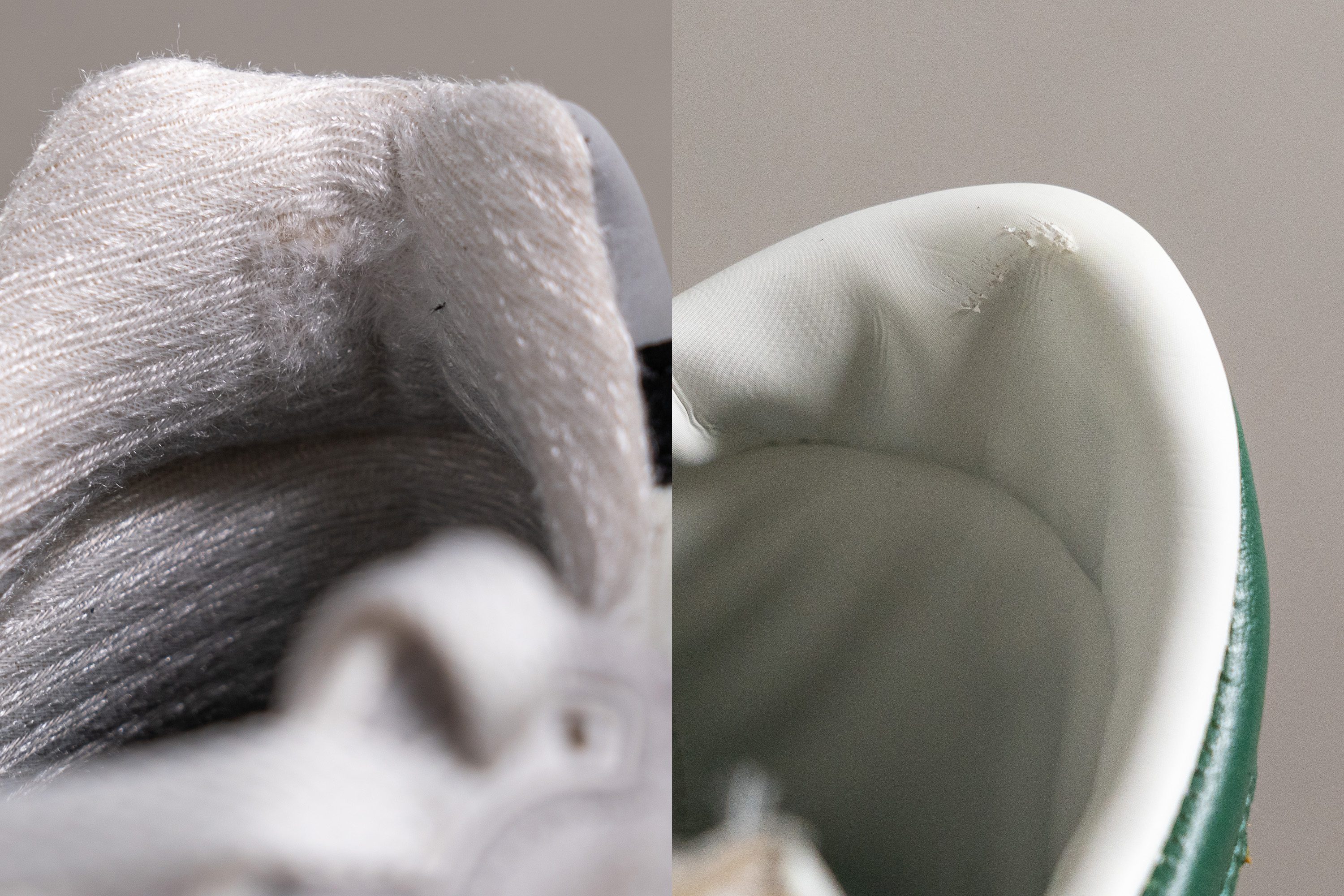
On the left, the 998 and its 2/5 on our heel padding durability test. On the right, the 990 v1 and its 5/5 on this same test. As you can see, the material doesn't even have a scratch!
| 998 | 2 |
| Average | 3.2 |
Outsole hardness
This shoe's outsole has two clearly divided sections: a black and a white one.
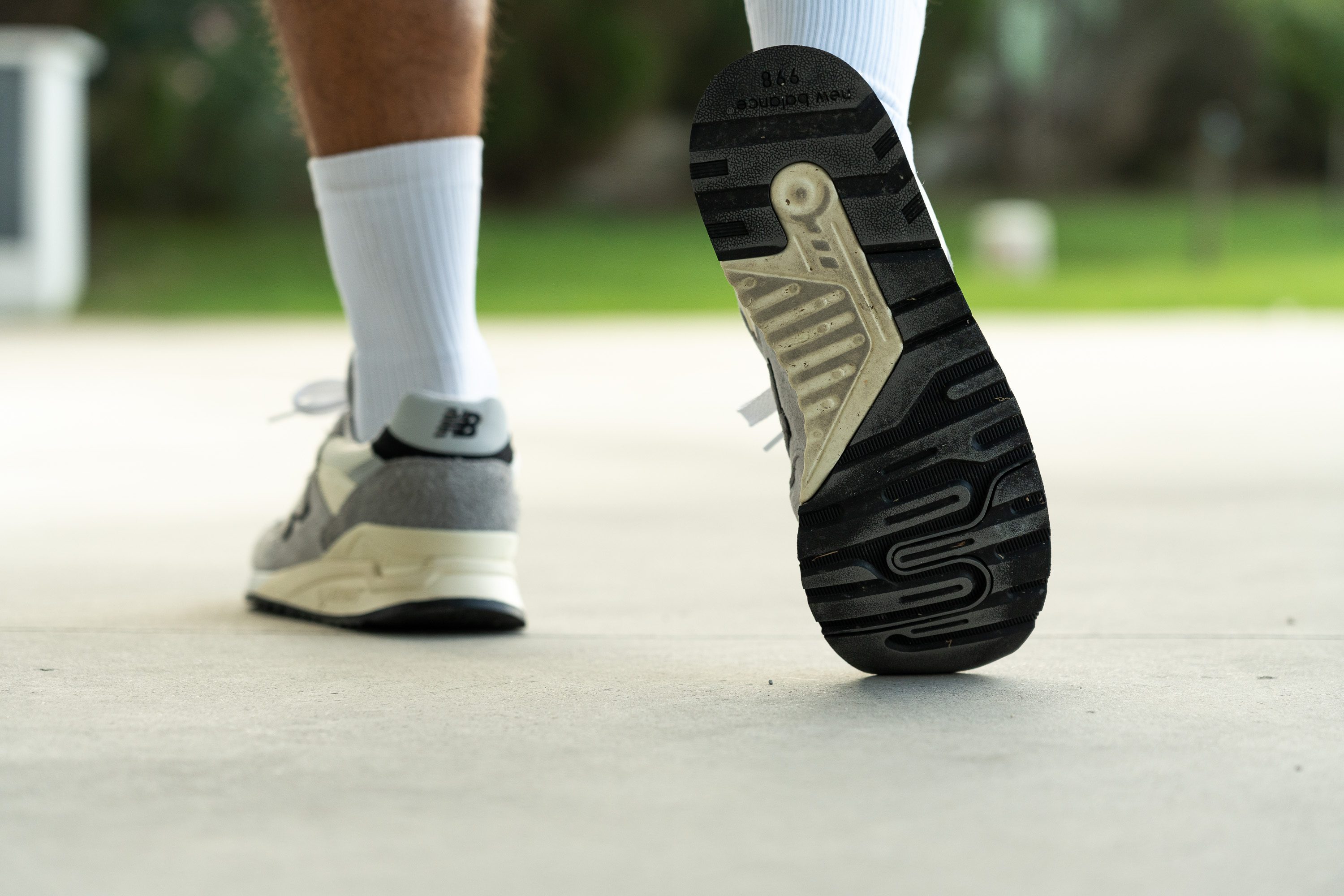
The black one is definitely a rubber compound, but the white one is basically an extension of the midsole's material. In other words, we're talking about two completely different things here!
To check the hardness of these two outsole sections, we grabbed our durometer and pressed it against them.
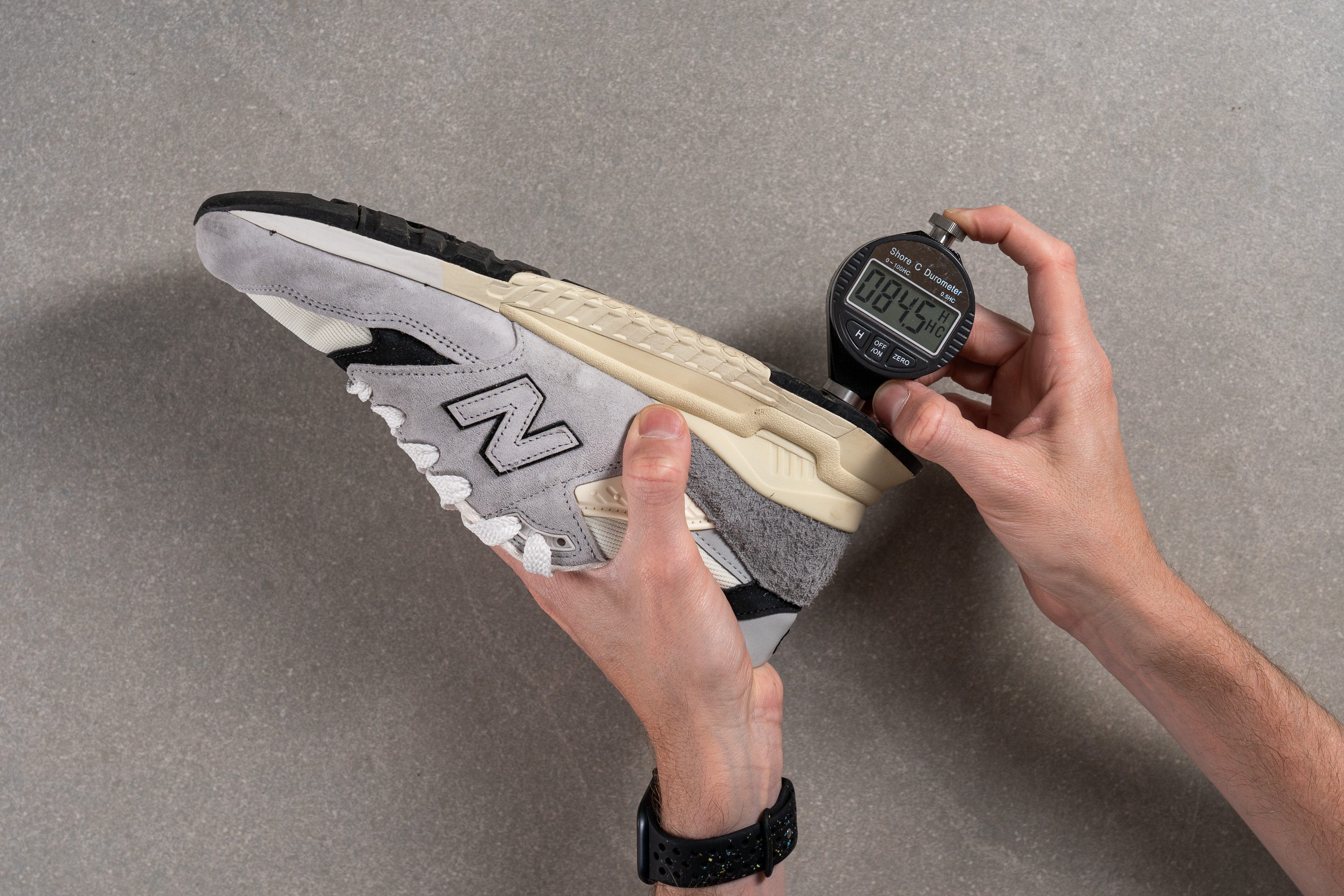
The black rubber compound scored 84.6 HC, which is average. This means it'll offer a healthy mix between grip and durability. But we will have to ask our Dremel about that!
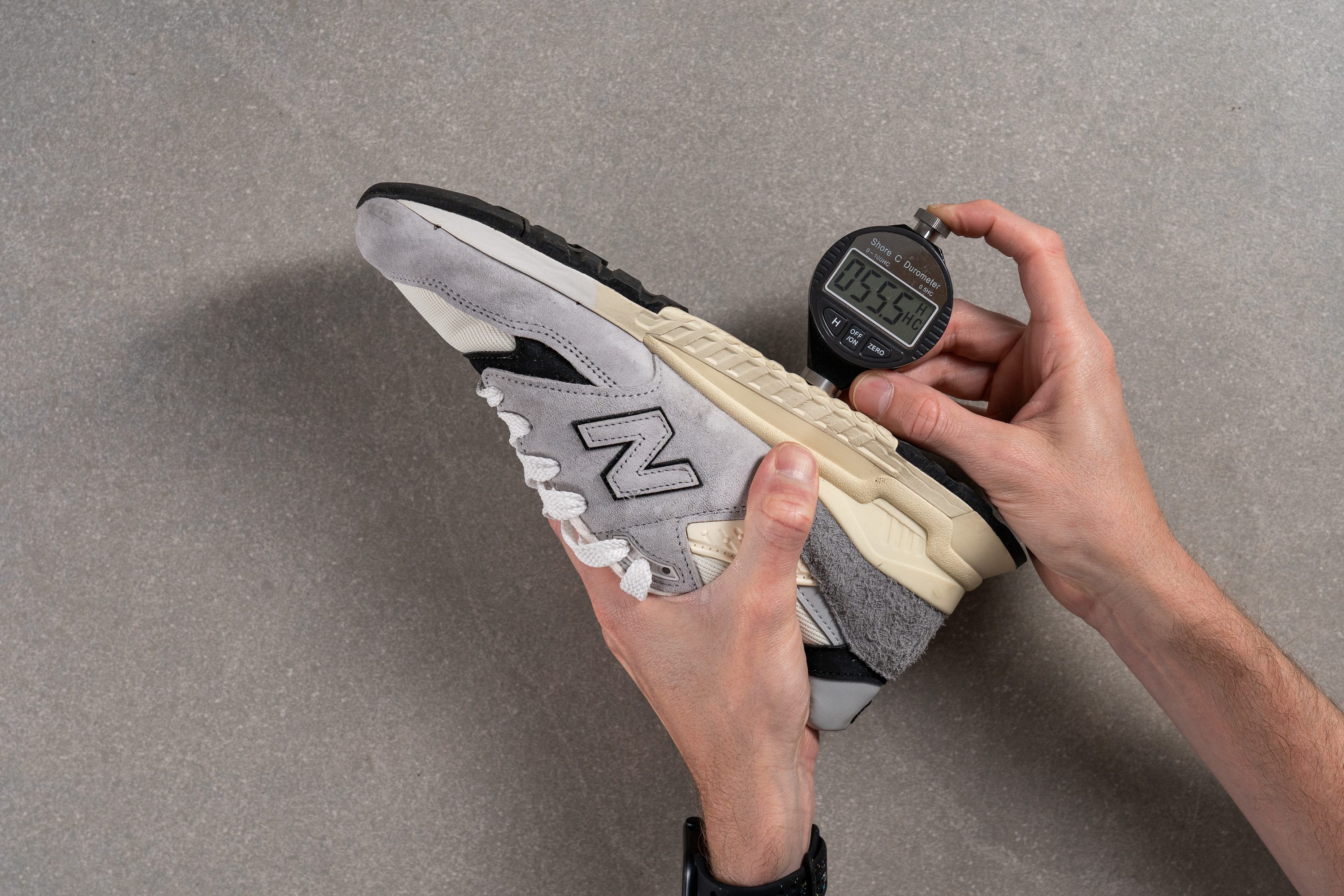
When we measured the white section, it returned 55.5 HC, which is 35% lower than average! Trust us, that really is a lot. This most likely means that the material is not very durable, even if its traction levels are high!
| 998 | 84.6 HC |
| Average | 85.7 HC |
Outsole durability
We always put our Dremel in the same spot on the durability test. In this case, it landed on the black rubber material, and we expect it to endure the drilling session much better than its white counterpart!
After 22 seconds at 10K RPM and with 3.2N of force, we put the tool aside to see the results. And, wow, it looked pretty good! So we got our tread gauge and measured the depth of the dent.
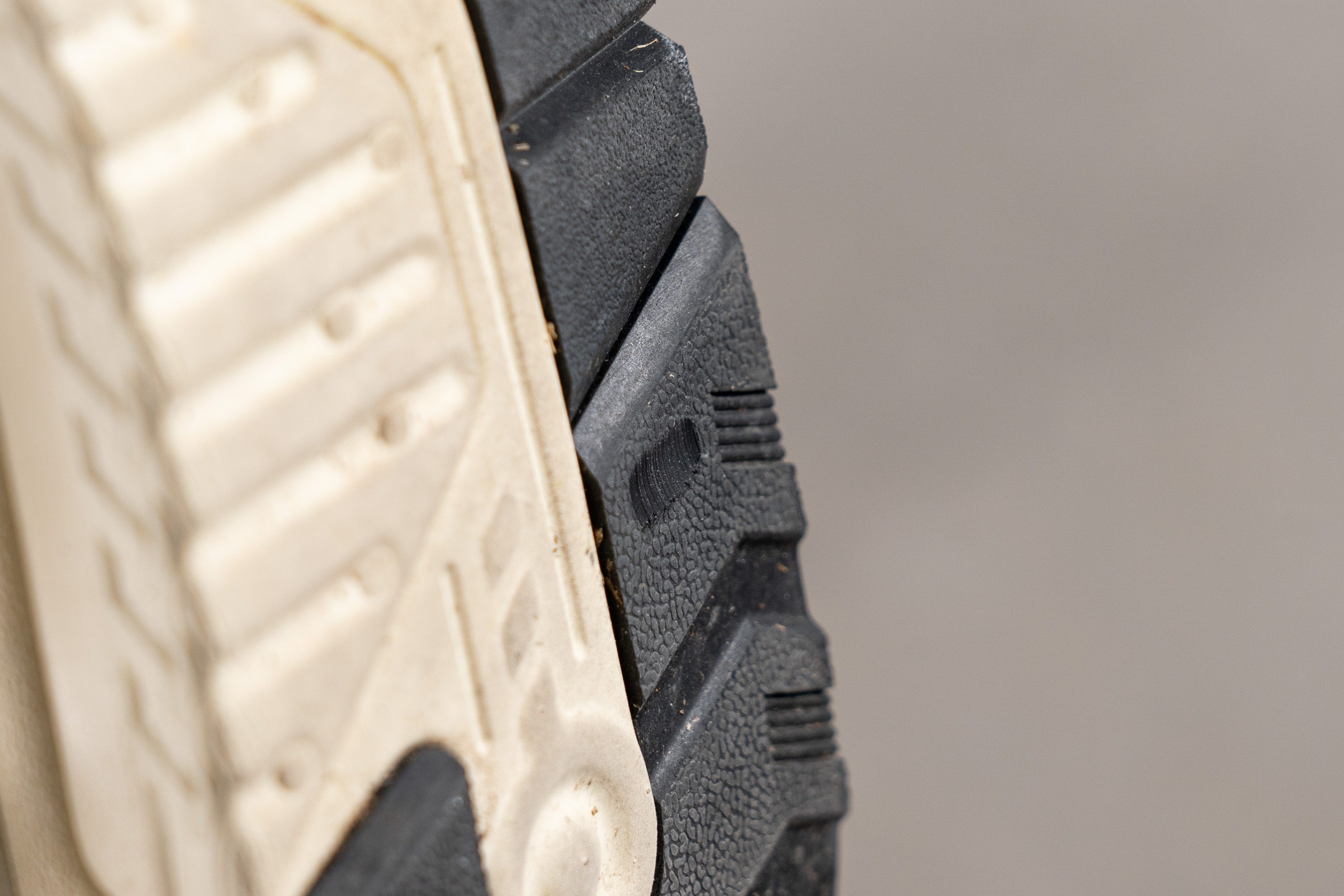
It returned 0.6 mm, which is way lower than average. This translates into wonderful durability, which is always great news!
| 998 | 0.6 mm |
| Average | 1.1 mm |
Outsole thickness
When our calliper marked 6.0 mm measuring the outsole thickness, we were pretty excited!
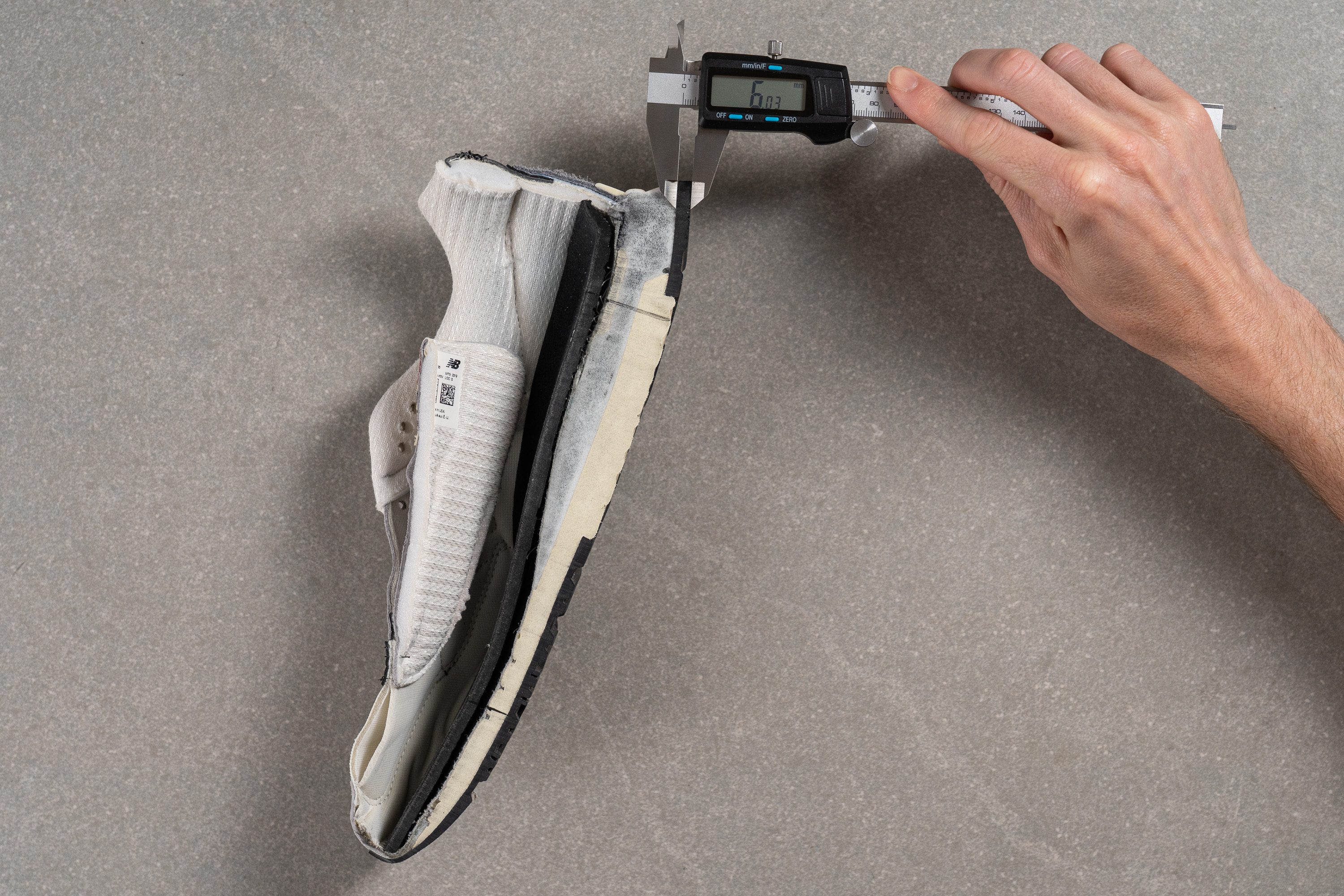
This result is higher than average, which means the shoe uses a bigger chunk of rubber to protect our underfoot from the surface. The 998 promises great durability with its hard outsole and thick rubber piece.
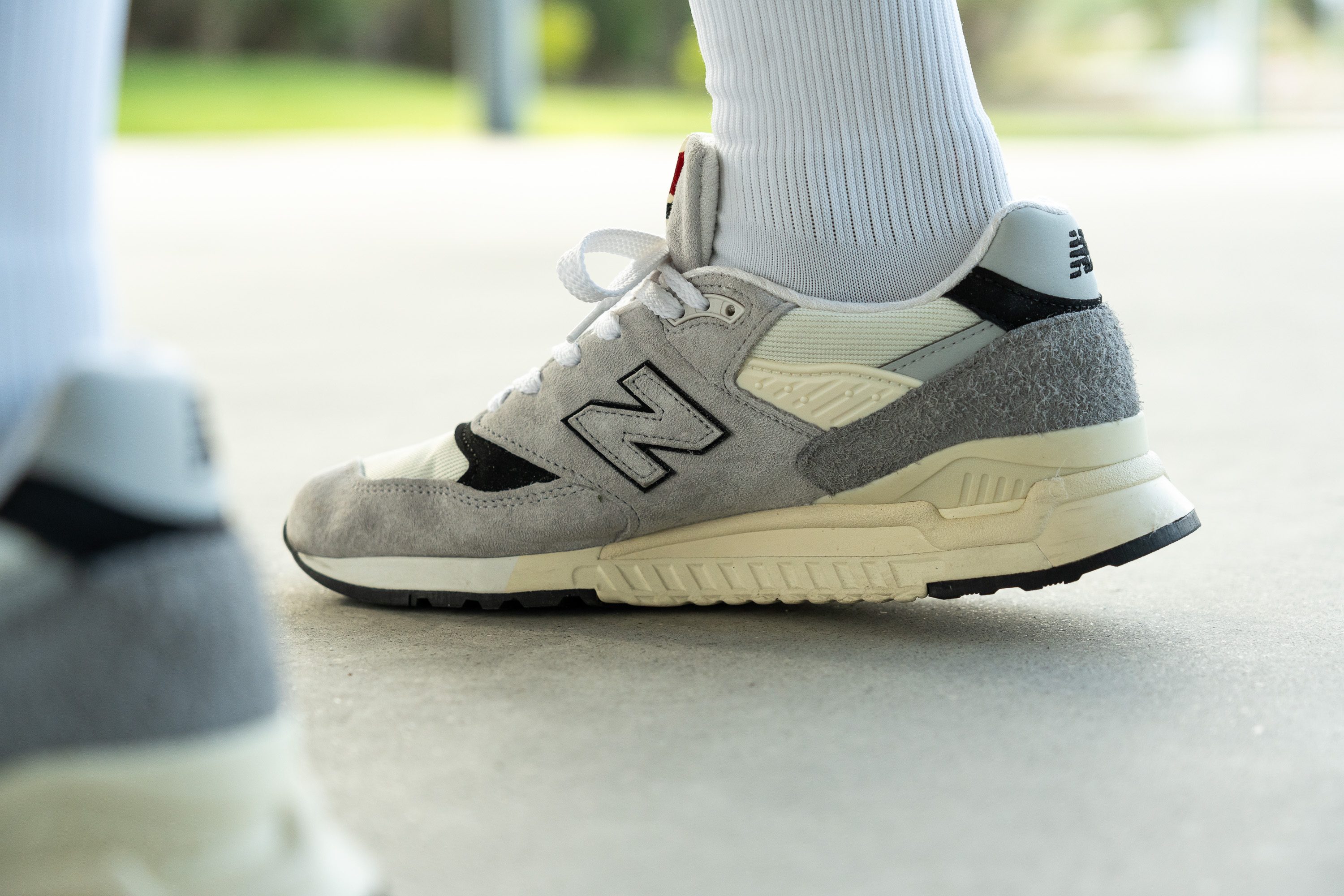
| 998 | 6.0 mm |
| Average | 5.3 mm |
Misc
Insole thickness
There's nothing spectacular to say about this shoe's insole.
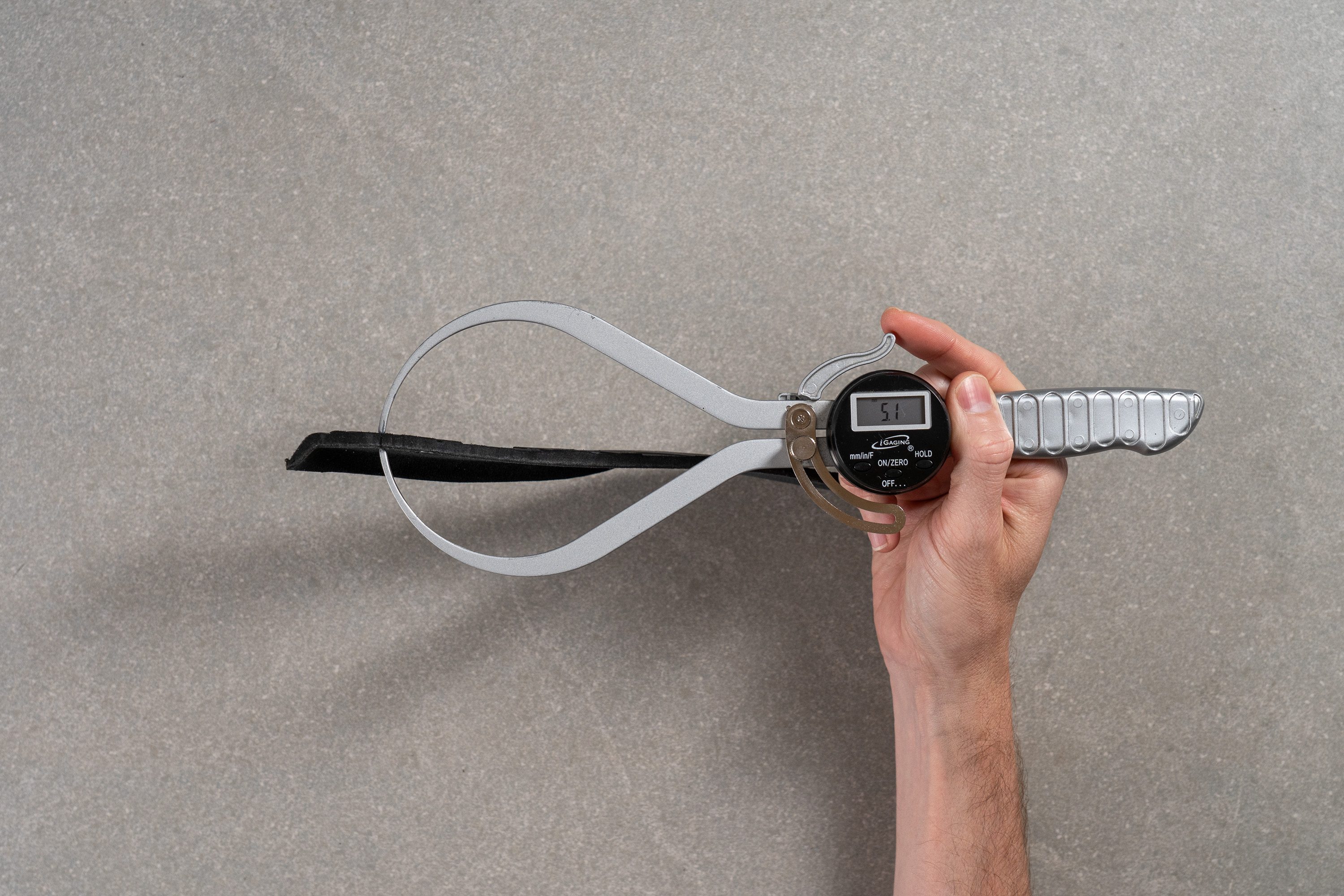
At 5.1 mm, its thickness is just average. We can't complain about it, but if you're not happy with it, you can always change it!
| 998 | 5.1 mm |
| Average | 5.1 mm |
Removable insole
As usual, New Balance decided to include a removable insole in the 998.
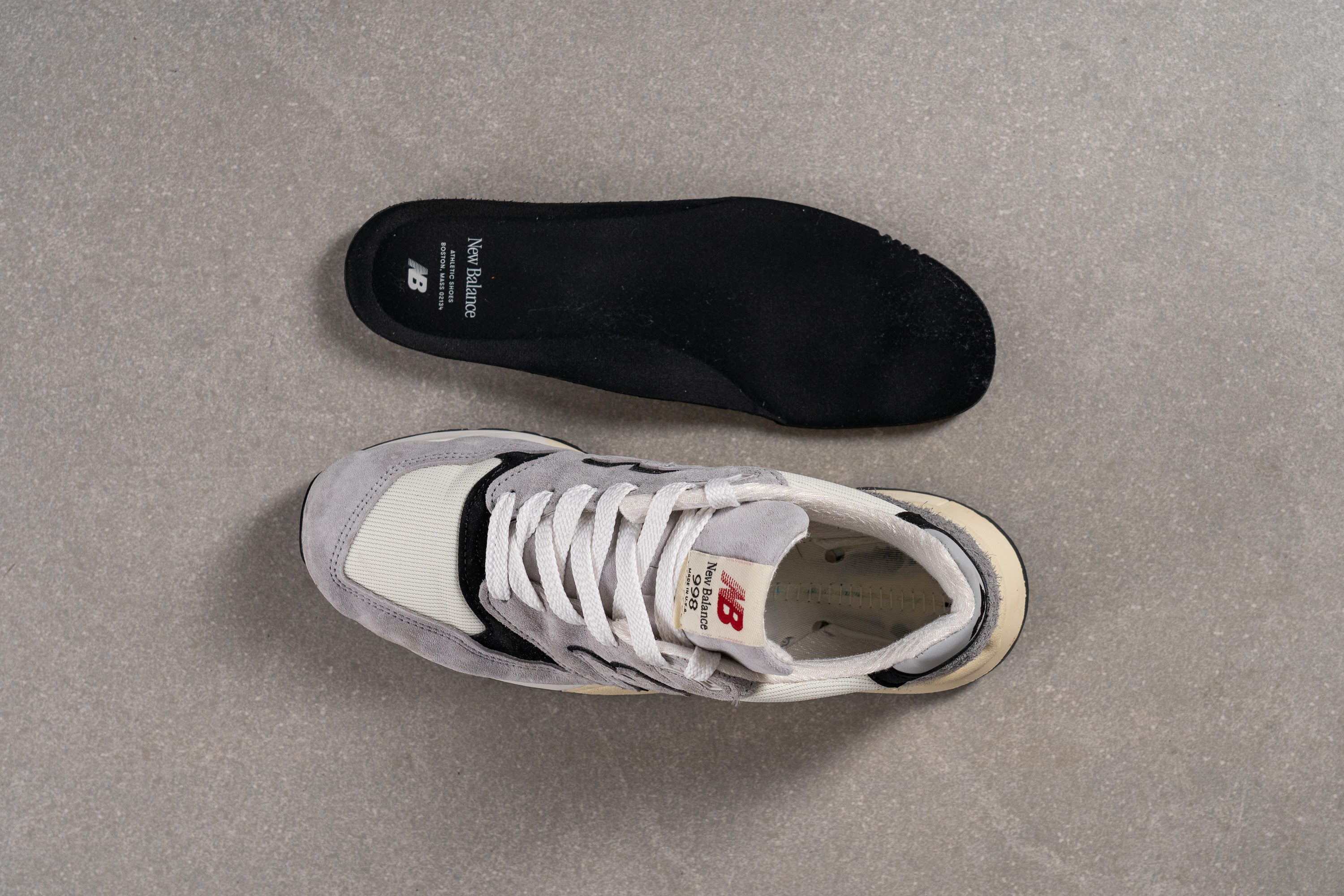
Consequently, if you want or need to change it and use your own orthotics, this pair won't complain at all!
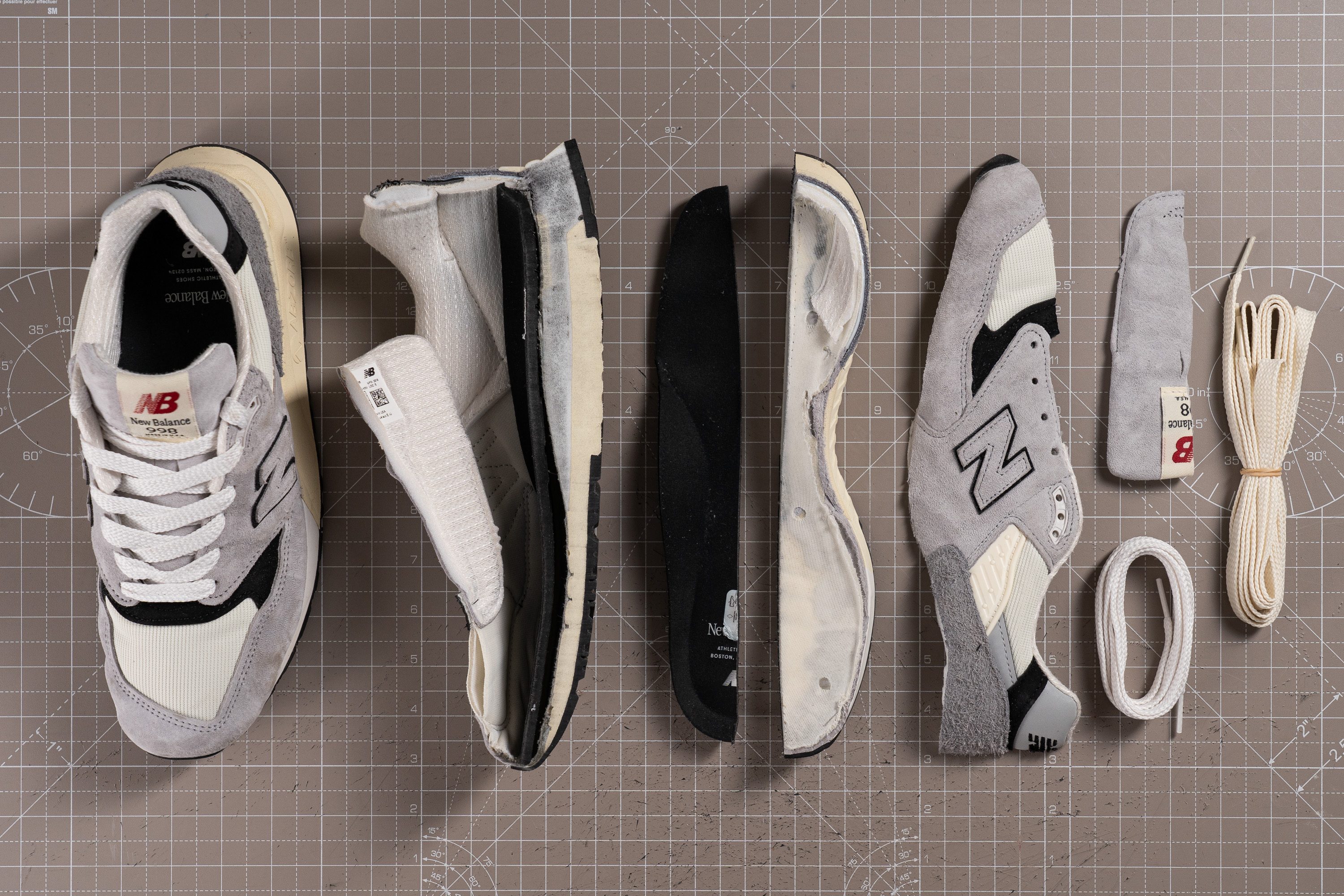
| 998 | Yes |
Reflective elements
Time to shine!
The 998 might not feature a heel tab, but it includes reflective elements on the heel area, which is really cool!
| 998 | Yes |
Tongue padding
A fairly padded tongue makes sure our feet don't experience any kind of lace bite.
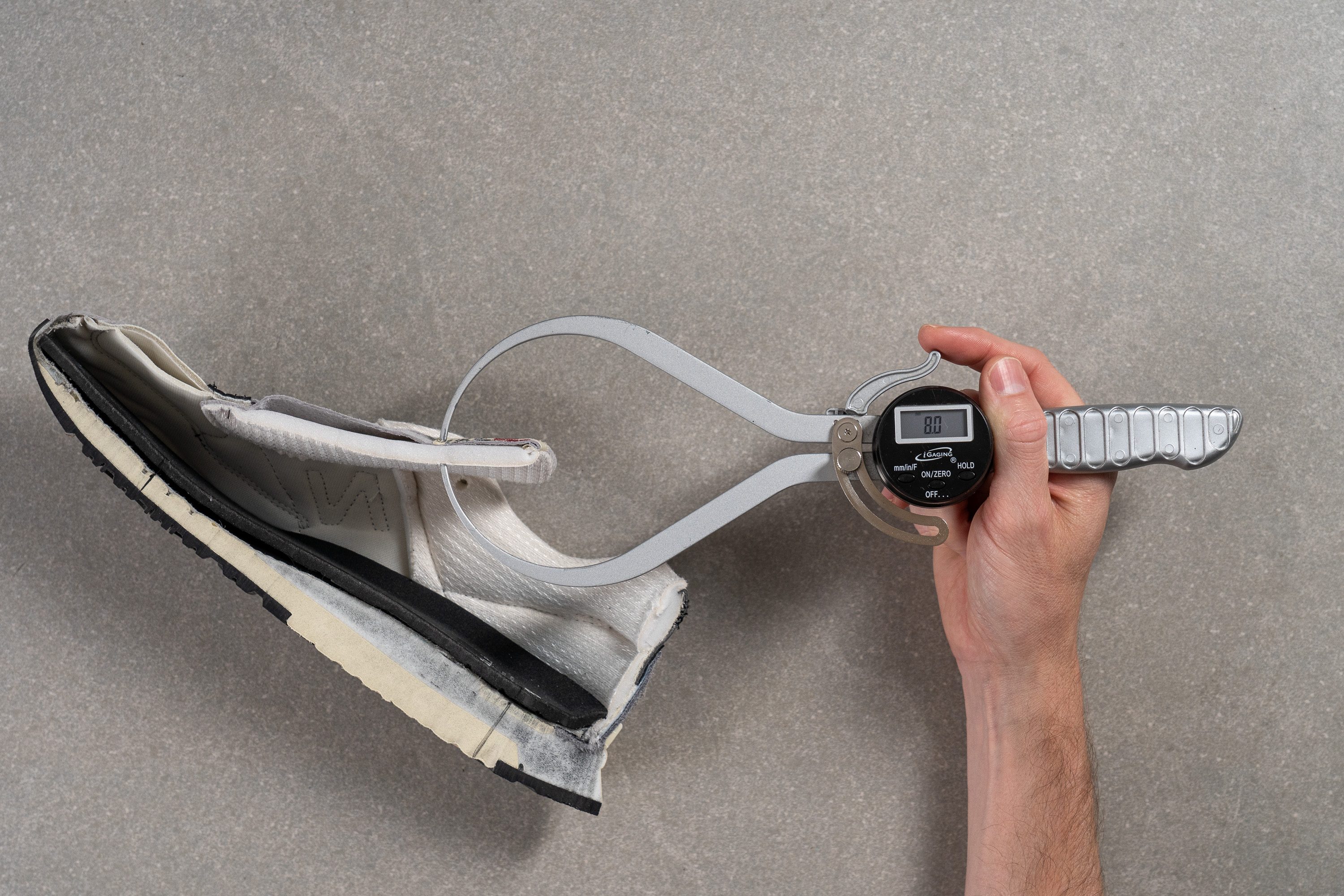
At 8.0 mm, our instep was protected and comfortable. Also, this tongue being less padded than average didn't have a negative effect on our feet. Quite the contrary, as it reduced the shoe's overall weight!
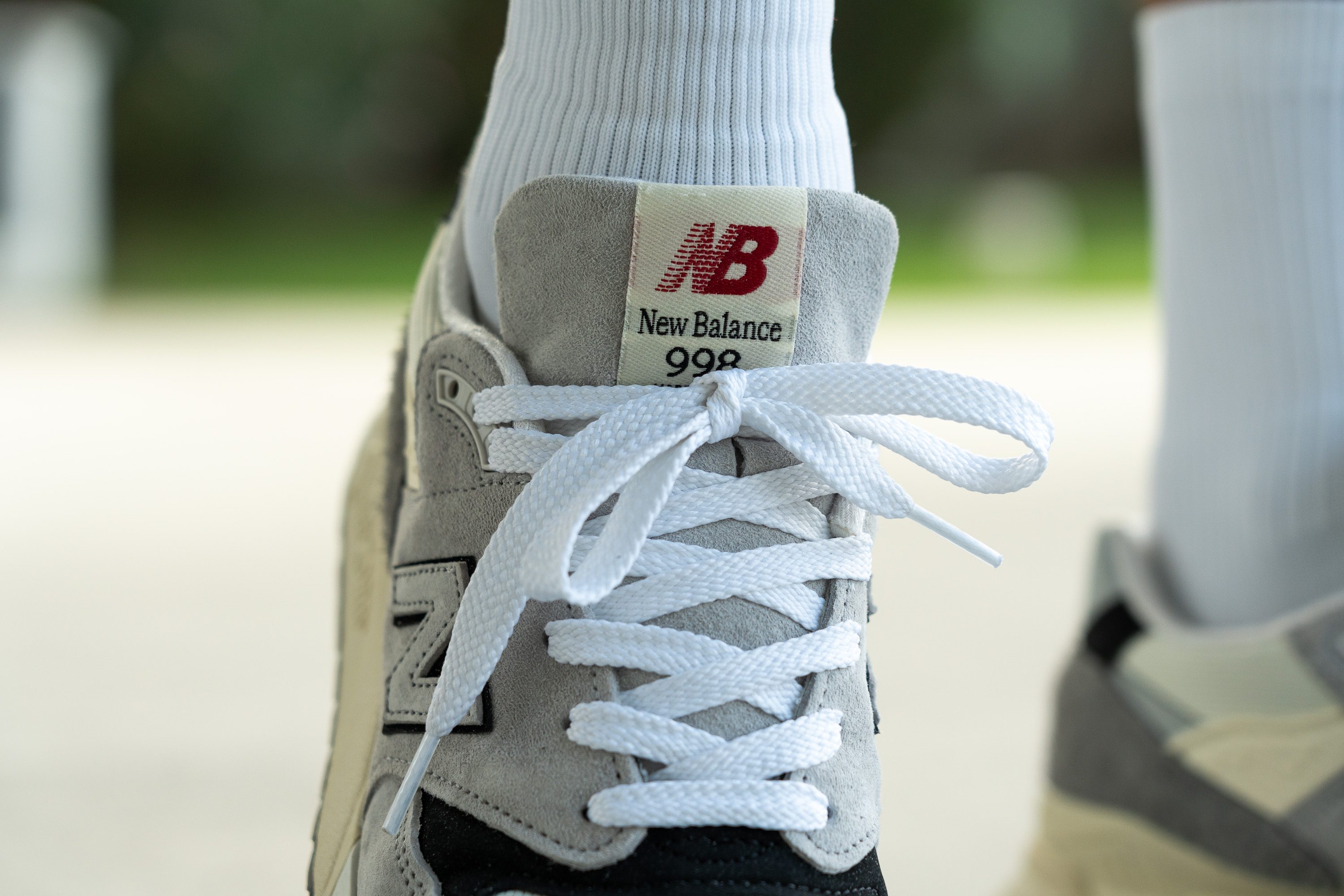
| 998 | 8.0 mm |
| Average | 9.6 mm |
Price
As a part of the Made in USA collection, the 998 has a high price point. We found it features top-notch materials, and the whole shoe boasts wonderful quality while keeping its classic New Balance look.
It also contains a domestic value of 70% or more, as the brand's website states!
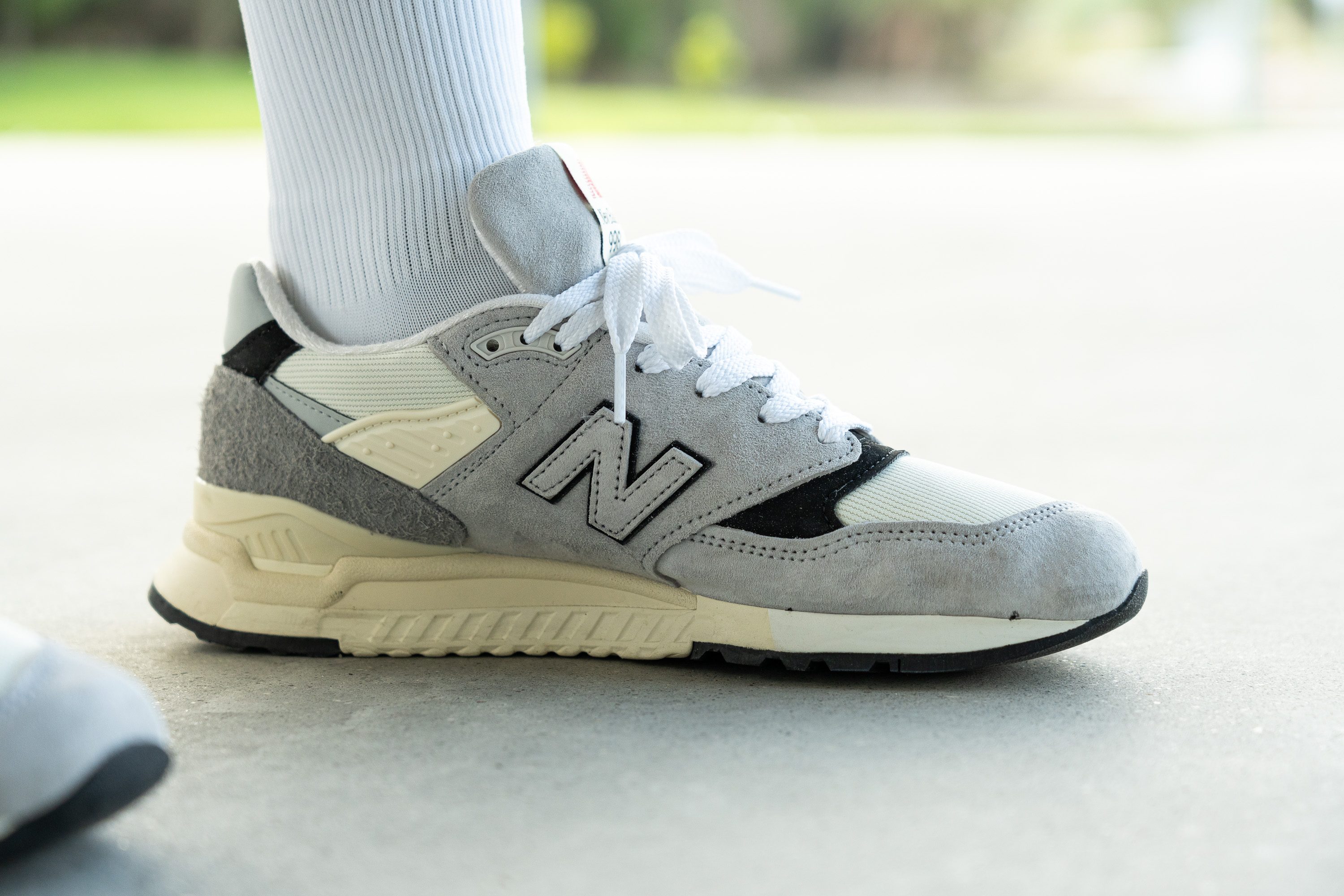
If you don't want to spend that much or you're on a budget, the New Balance 574 might be worth checking out. It has a very similar vibe and you can also wear it from sunrise to sunset!
| 998 | $185 |
Heel tab
This New Balance doesn't have a heel tab.
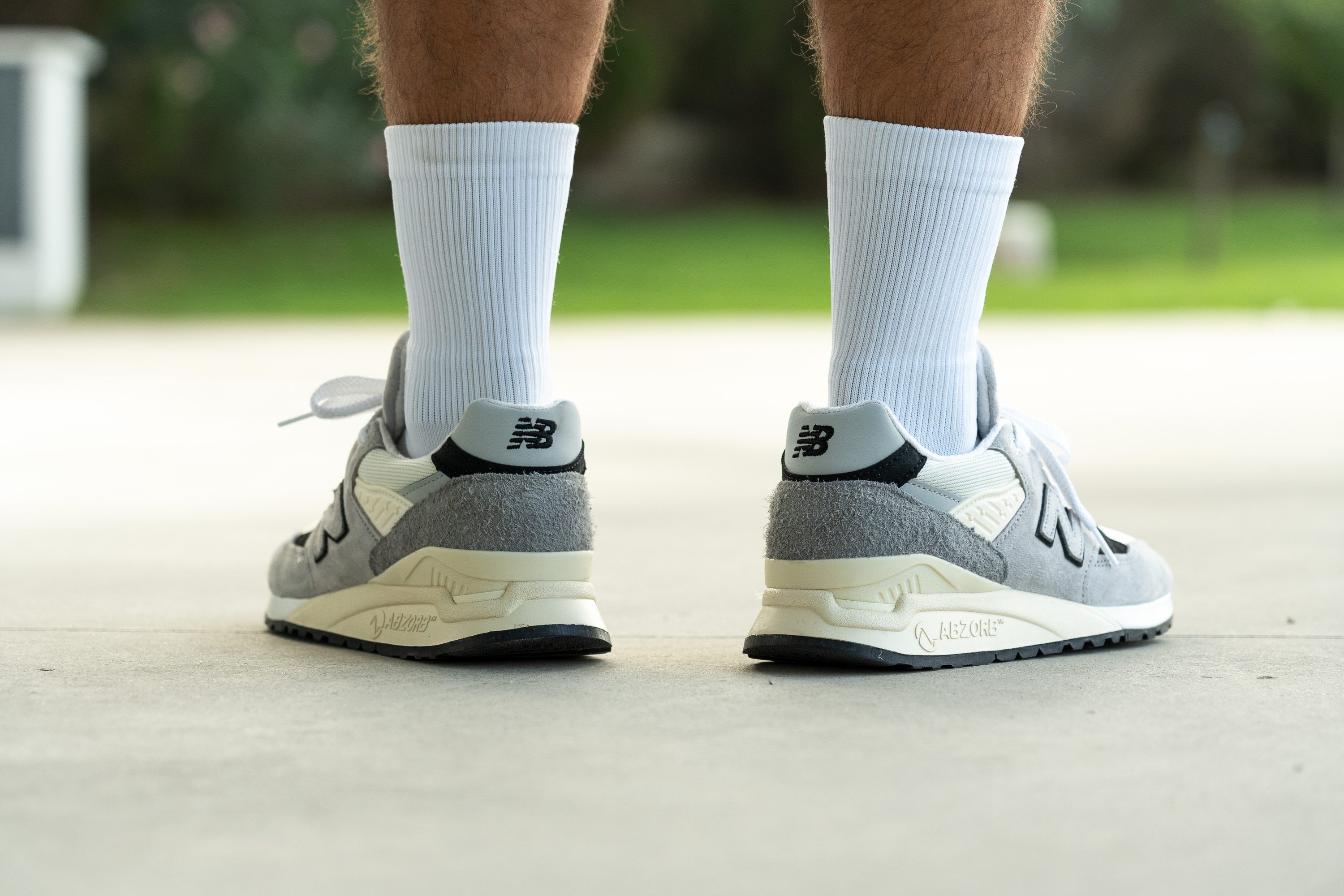
But we didn't miss it or anything. In fact, we can't wait to show you what this shoe features in that area! Stay tuned!
| 998 | None |

